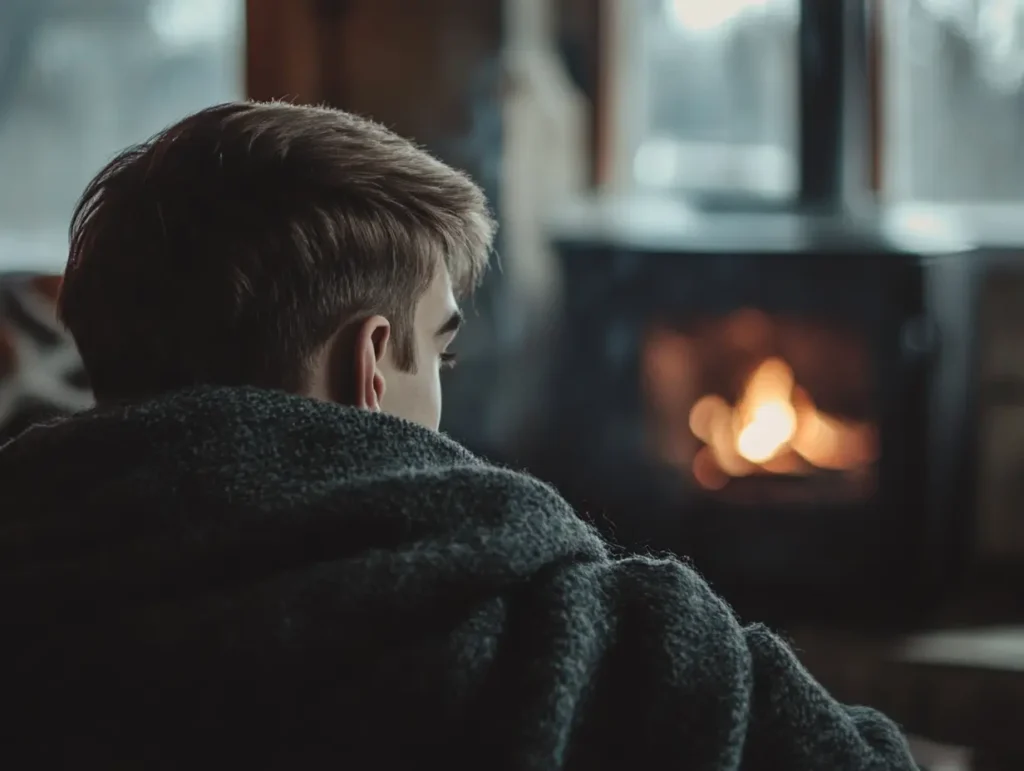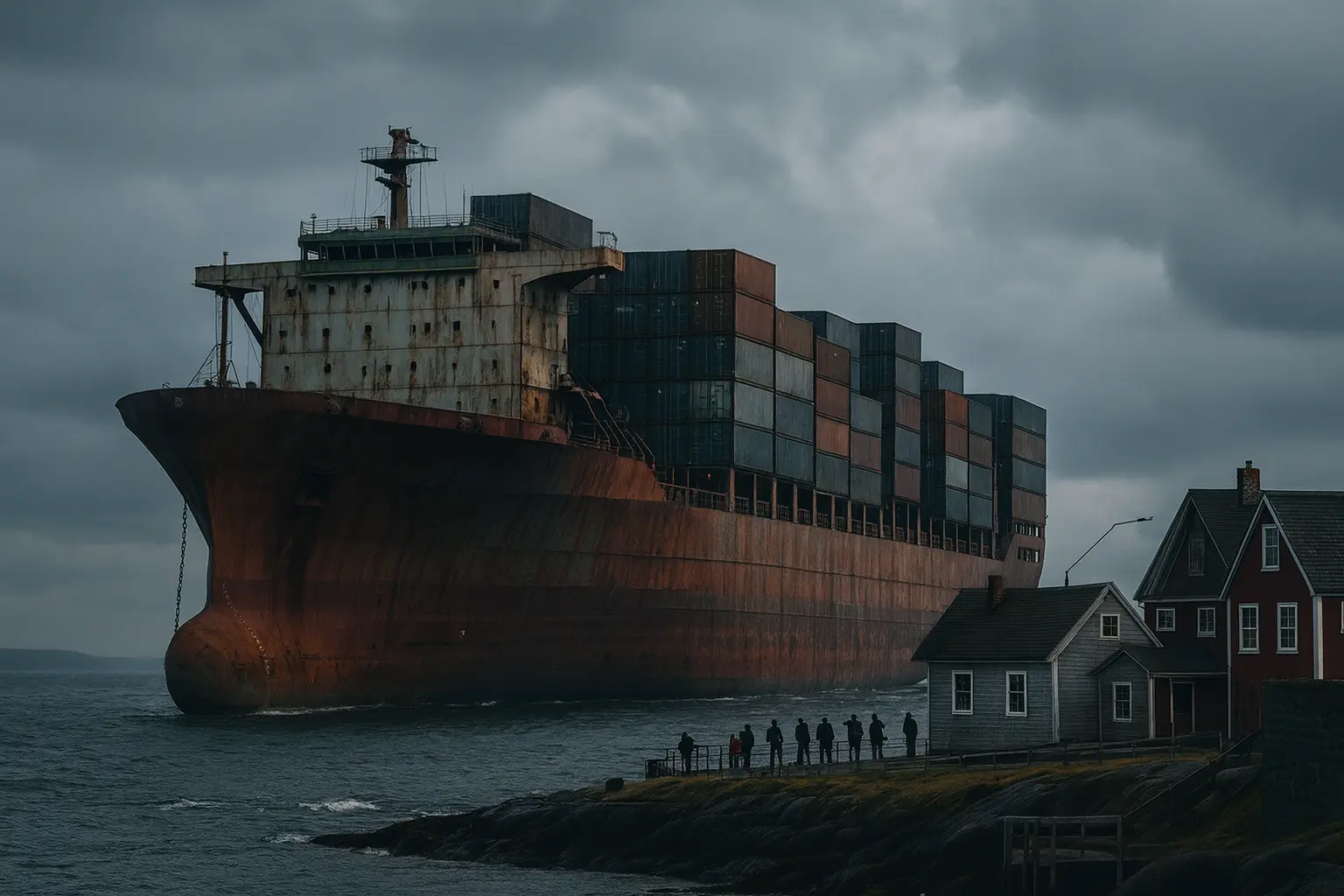The ship emerged from the morning mist like a nightmare, a mountain of rusted steel drifting silently toward Portmere. Shouts rose as villagers rushed to the cliffs, faces pale as the freighter loomed larger with every swell. Mothers clutched children, fishermen cursed, and for a breathless moment it seemed certain the ship would grind into the harbor.
Its bow cut the waves with slow, heavy force, tilting as though it might lean into the village at any moment. Warnings rang out but were swallowed by the sea’s roar. Elias stood among them, heart hammering, staring at the giant that seemed too close, too unstoppable to ignore.
Then, movement. He raised his binoculars and froze. Amid the leaning containers, a figure stood, arms raised high, waving. A plea, a signal, something alive on a ship that should have been empty. Elias blinked, and the deck was bare again. Yet the memory of that desperate wave clung to him as the vessel drifted closer to shore.
Elias had lived in Portmere all his life, a small seaside village where the days were ruled by the tides. Most mornings he rose early, pulling on his boots to check nets along the shore. He wasn’t much of a fisherman anymore. His father had been, but Elias made his living doing odd jobs around the harbor.
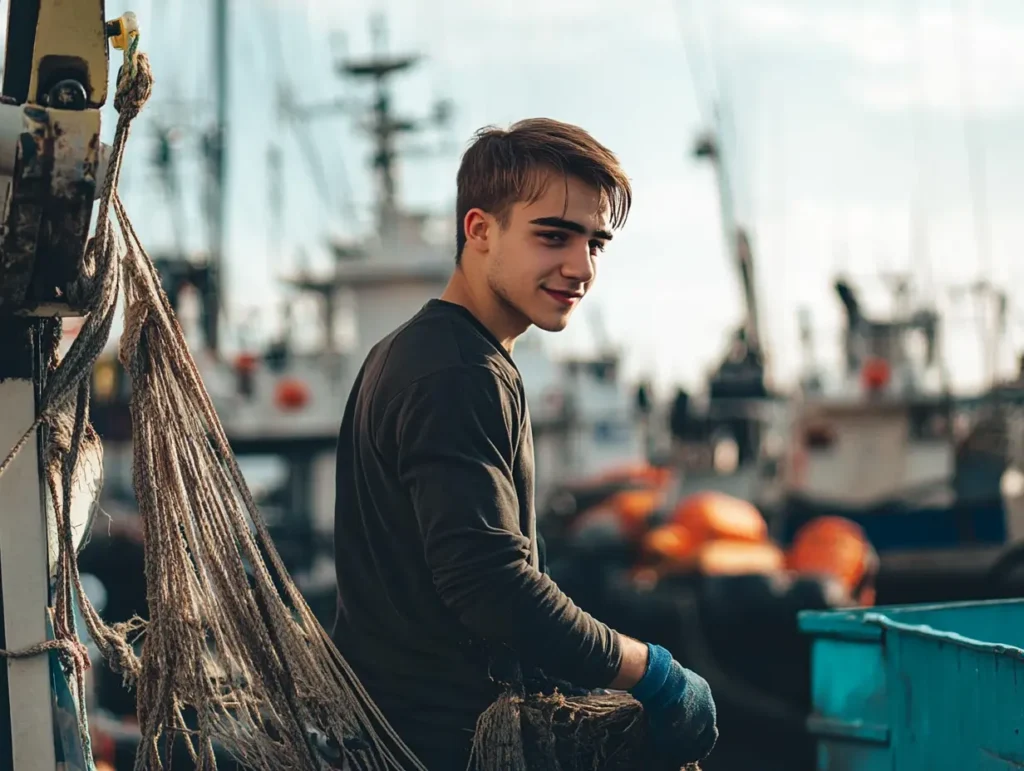
He fixed ropes, patched holes in boats, and helped unload the catch when the trawlers came in. It was steady work, though it often felt too quiet for someone who carried so much restless energy. In the evenings, he liked to sit on the cliffs above the sea, staring out at the horizon.
That restlessness also made him a light sleeper. The slightest noise could pull him awake, leaving him staring at the wooden beams of his ceiling. So when the shouting began that morning, it cut through the quiet like a blade. At first he thought it was fishermen arguing at the docks, but the voices had a different edge. They weren’t angry. They were scared.

He sat up quickly, heart already racing, and pushed his feet into his boots. Outside, the lane was full of neighbors rushing past, faces pale and eyes wide. Someone dropped a basket of fish that flopped helplessly on the stones. Mothers pulled children along by the hand. Everyone was heading the same way, toward the cliff path that overlooked the bay.
Elias hurried after them, his mind spinning with questions. As he reached the top, he heard the cries: “It’s coming straight for us!” “Look at the size of it!” He pushed through the crowd, and then he saw it for himself. Out on the water, drifting silently toward the village, was a massive ship. Its hull was streaked with rust, its cranes frozen in place, its windows dark.
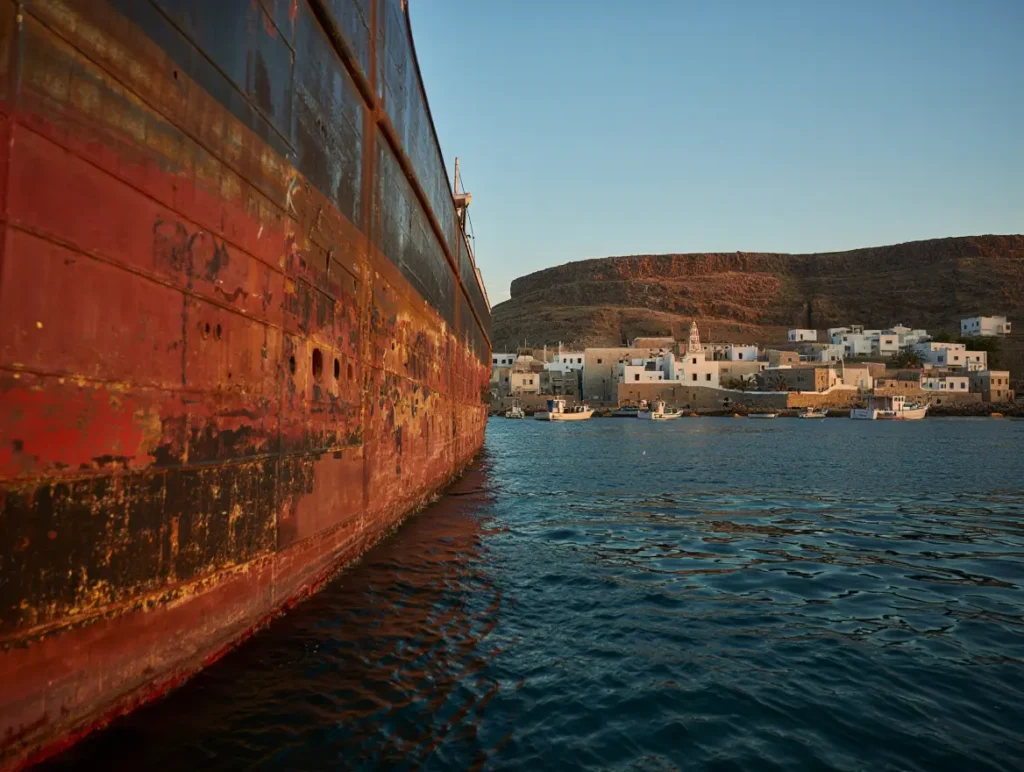
The morning sun made it glow like a giant shadow of iron, sliding closer with every heartbeat. The crowd on the cliffside grew louder, voices tumbling over one another in panic. From where they stood, the massive ship looked like it was gliding straight for the harbor.
Children cried, men cursed under their breath, and women held their hands to their mouths as if bracing for an impact. “It’ll crush the boats!” someone shouted. “Straight into the pier!” another added, pointing with trembling fingers. But Elias kept his eyes steady on the vessel’s bow. He followed the angle of its drift against the outline of the harbor wall.
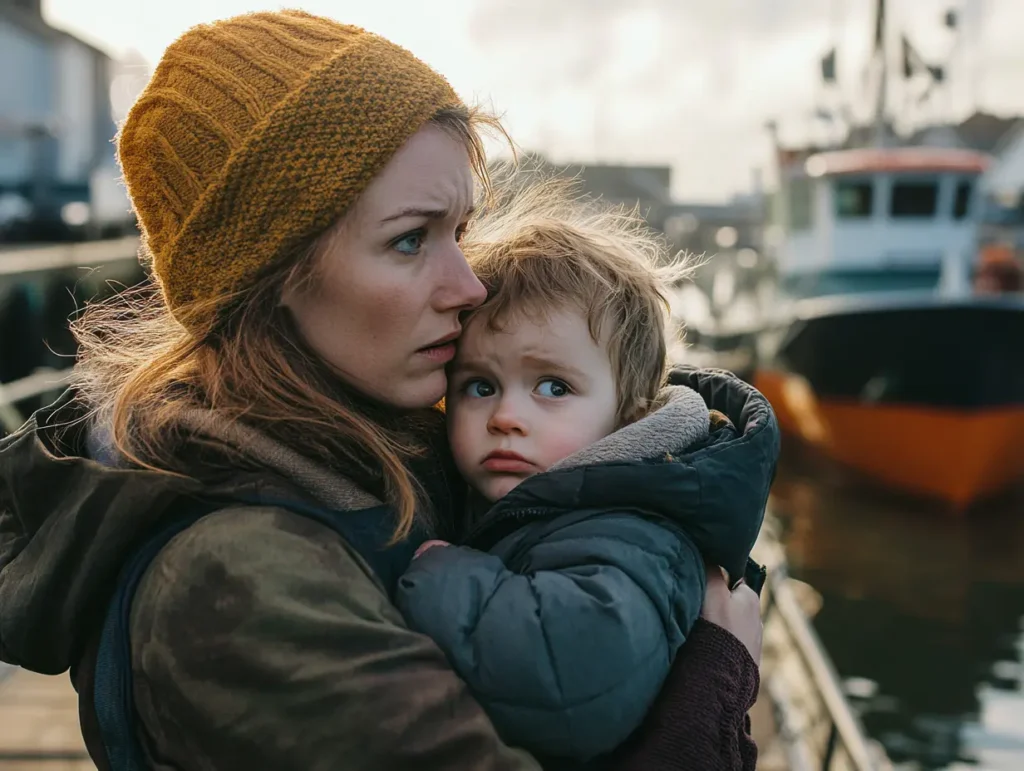
His heartbeat slowed as he worked it out in his head. “No,” he muttered. “It’s not going to hit.” And sure enough, the more he studied it, the more certain he became. The ship would pass close, so close it would feel like a near miss, but it would not strike the pier. The realization brought a flicker of relief, but the others didn’t seem convinced.
Their voices carried on, loud and frantic, until someone finally echoed what Elias had been thinking: “Wait—look. It’s sliding past. It’s not going to crash.” Like a tide pulling back, the fear in the crowd began to ebb. Laughter, nervous and shaky, replaced cries of alarm. Mothers soothed their children. Fishermen clapped each other on the shoulder.
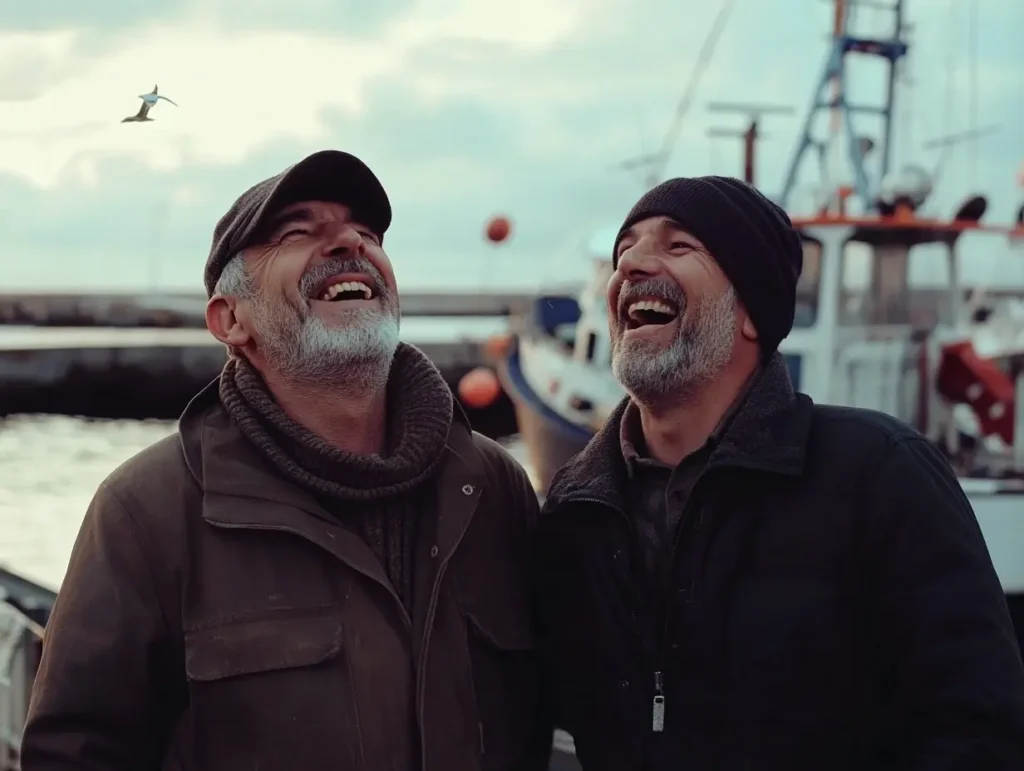
Already, some turned away, ready to head back down the cliff and return to their interrupted morning routines. But Elias couldn’t move. His eyes lingered on the rusted giant, on the leaning containers and shattered windows. The whole thing looked deserted, a ghost drifting on the current.
Without thinking, he slipped the strap of his binoculars from around his neck. They were old, a hand-me-down from his father, the leather fraying at the edges, but the lenses were sharp. He lifted them and focused on the ship’s deck. At first, he saw only what he expected; peeling paint, broken railings, twisted metal.

Then, something moved. His breath caught. Between two stacks of containers, a figure stepped into view. Elias’s grip on the binoculars tightened. The figure raised its arms, once, twice. A wave. His chest tightened. Someone was alive on that ship. Someone was asking for help. “Look!” Elias lowered the binoculars and grabbed the arm of the man beside him.
“There’s someone on board!” Elias’s voice cracked as he lowered the binoculars. The man beside him frowned. “What are you talking about?” “Between the containers!” Elias thrust the binoculars into his hands. “They were waving, see for yourself!”
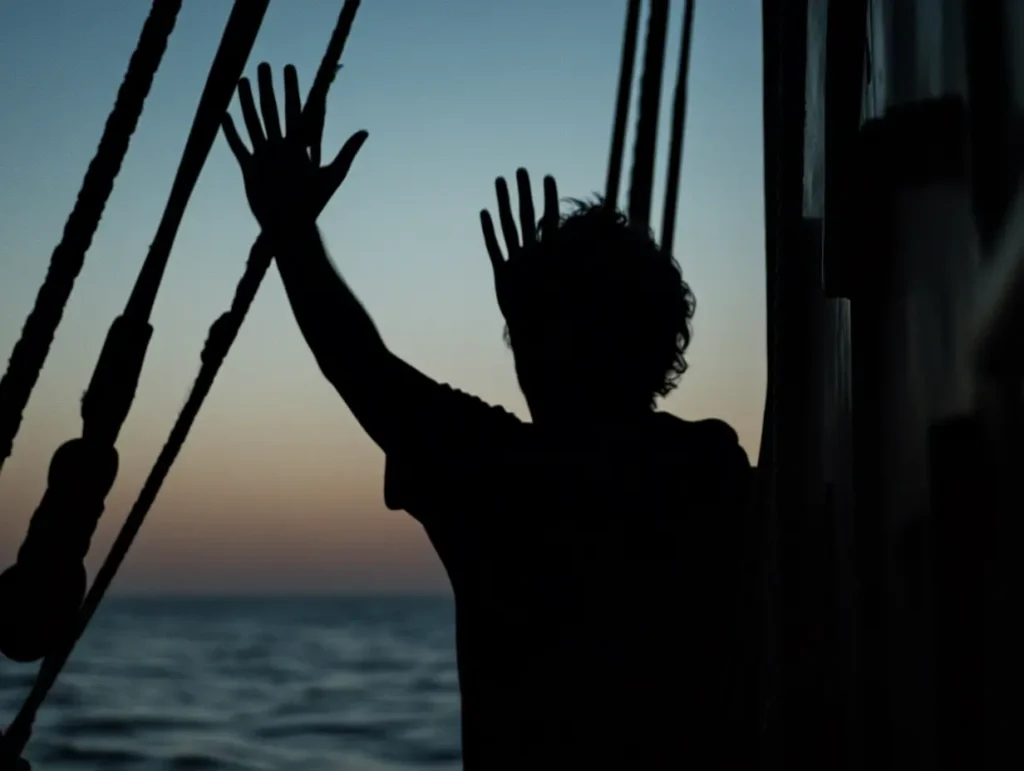
The man adjusted the focus, squinted, then pulled them down with a shake of his head. “Nothing. Just rust and shadows.” Elias snatched them back, breath fogging the glass. He searched again, desperate. Empty. Only rain-slick metal and peeling paint. But he knew what he’d seen. The wave had been too sharp, too human. Someone was there.
Sirens cut through the murmurs of the crowd. Two police cars nosed into the harbor, lights flashing. Officers in reflective jackets spilled out, pushing people back with raised arms. “Stay clear! The harbor’s closed until the coast guard arrives.”
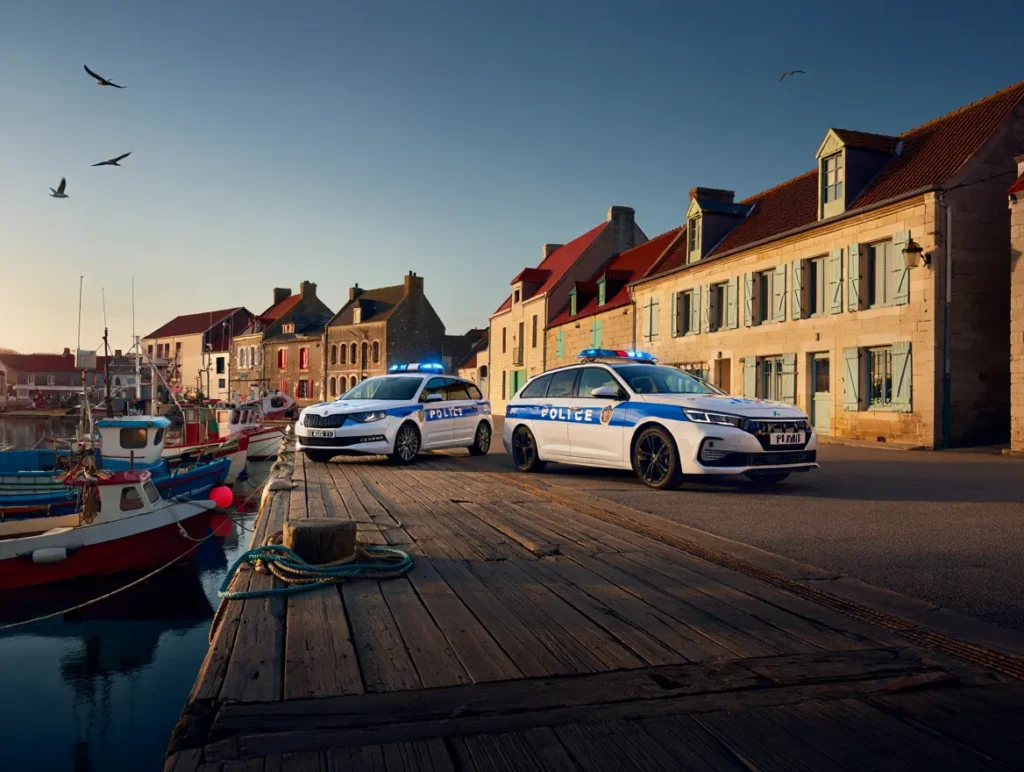
Elias pushed forward, shouting above the storm. “Wait—listen! There’s someone alive on that ship. I saw them waving. They need help!” One officer, tall and broad, stepped in his way. “Son, what you saw was spray and shadows. We’ll handle it.”
“I’m telling you, it wasn’t shadows!” Elias snapped, frustration boiling. “He was waving—he looked desperate!” Another officer smirked. “ Go home. Coast guard will board it when it’s safe.” The first officer’s voice hardened. “Enough. We’ve got it under control. Don’t make trouble.”
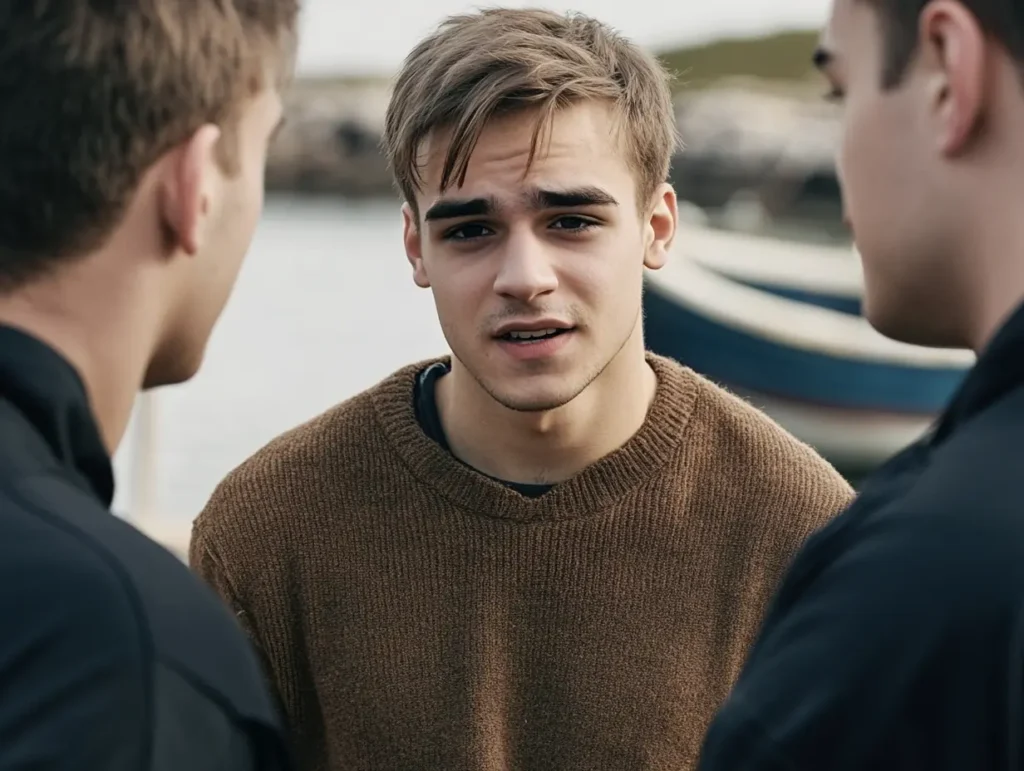
The crowd began to disperse, satisfied—or at least too rattled to argue. But Elias stood rooted, rain dripping into his eyes, his heart pounding with anger. He could still see the figure in his mind, arms lifted against the storm, as if begging not to be forgotten.
They weren’t going to do anything. Not soon enough. And if Elias walked away now, whoever was on that ship would vanish again, swallowed by the sea. He turned and slipped into the alleys, keeping to the shadows as the police taped off the piers.

His skiff wasn’t tied at the docks anyway—it was further down the coast, hidden on the rocks where he often moored it. That distance, usually a nuisance, was now his chance. Elias’s jaw tightened. If no one else would help, he would. The storm was building, the risk enormous, but the image of that desperate wave burned in his mind. He would not let it go unanswered.
He adjusted the coil of rope over his shoulder, heart thudding as the skiff came into view. There it was, bobbing lightly in the water, small but sturdy. His way out. His way to the truth. Elias glanced back once, making sure the harbor was clear, before stepping onto the stones and untying the line.
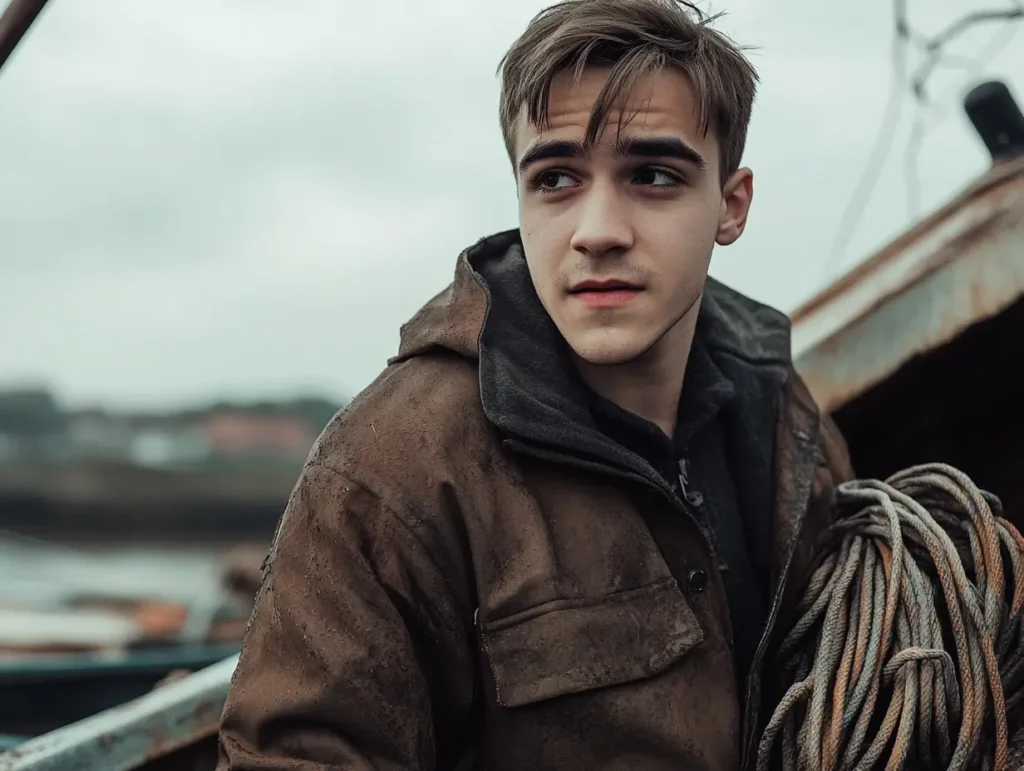
The rope slipped free with a soft splash, and the skiff rocked as he climbed aboard. The police might have blocked the docks, but they couldn’t block the sea. By the time Elias reached his skiff, the sky had darkened. What had been a calm morning was shifting, clouds rolling in from the horizon like a slow army.
He set the rope coil down on the bench and bent to check the fuel in the outboard motor. That was when he felt the first drops of rain, cool against his neck. Within minutes, the drizzle grew heavier, pattering on the wood of the boat, turning the rocks slick beneath his boots. Elias glanced up at the sky, cursing under his breath.
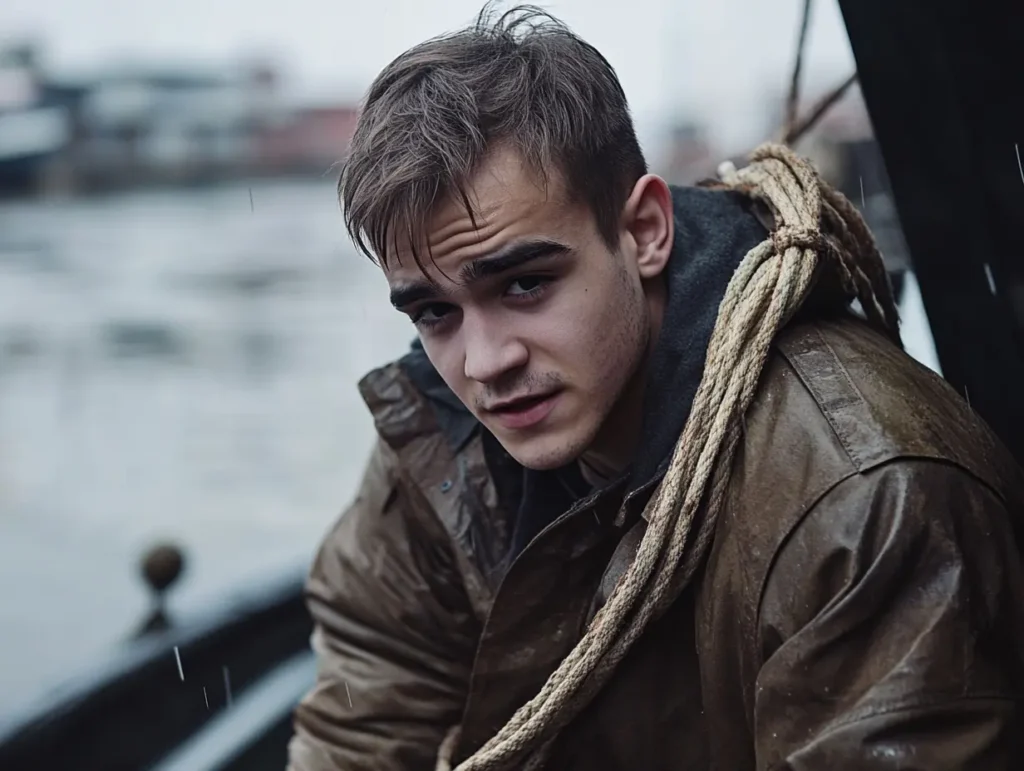
The weather was turning fast, and with it, the climb he had imagined was no longer a simple risk, it was outright dangerous. But the thought of the figure waving from the deck anchored him. He couldn’t let the rain stop him now. Whoever was out there might not survive another day if nobody acted.
He looped the rope securely, stuffed the hook beneath the seat, and tightened his coat. His hands shook, not only from nerves but from the cold creeping in with the rain. The engine coughed, sputtered, then roared to life. Elias pushed the skiff free, jumping aboard just as it rocked loose from the stones. Rain blurred his vision, forcing him to squint against the drops.
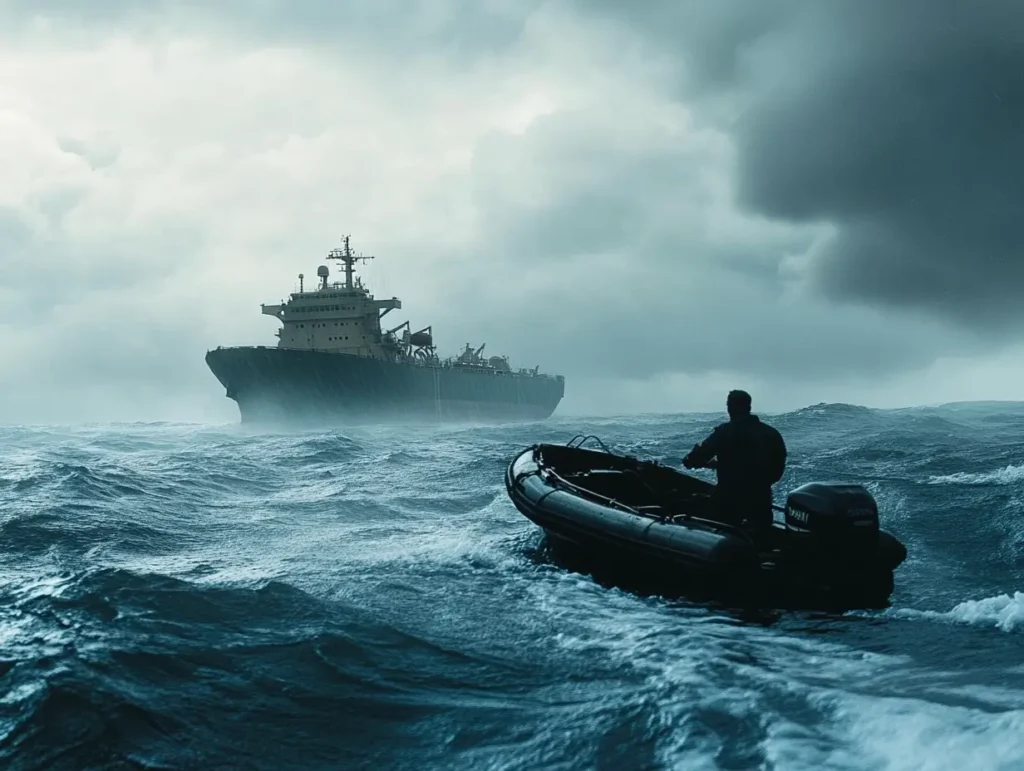
The police were still gathered near the main docks, their reflective jackets like beacons through the haze. He cut his engine to half power, steering wide of the patrol boats. His heart pounded as he slipped past unnoticed, the rain now working in his favor as it muffled the sound of his motor. The closer he drew to the drifting freighter, the larger it loomed.
Its hull rose like a wall, dark and streaked with rust that glistened wet in the rain. Water dripped steadily from broken cranes. The ship groaned with each swell, a hollow, metallic sound that echoed across the waves. Elias swallowed hard, forcing down the knot of fear in his throat. The skiff felt impossibly small next to the giant.
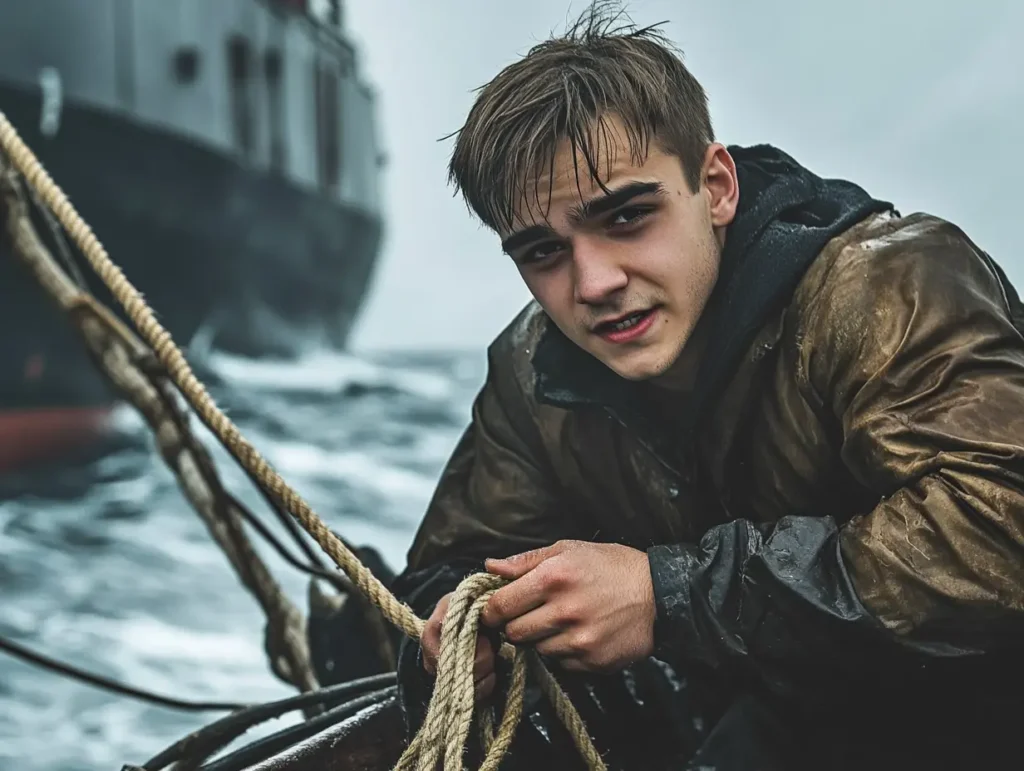
He grabbed the rope, tied the hook securely, and prepared himself for the climb. The rain made everything slick. The rope slipped in his wet hands as he tested its grip against a jagged opening in the hull. His breath fogged as he looked up, measuring the climb. One misstep, and the sea would swallow him whole.
A wave smacked the skiff, jolting him. He steadied himself, pressing the rope hard against the hull until the rocking eased. Above him, the freighter’s deck stretched like a shadowy promise. He thought of the figure waving earlier, gone now, but maybe still there, waiting. “Here goes,” he whispered to himself, voice lost to the storm.
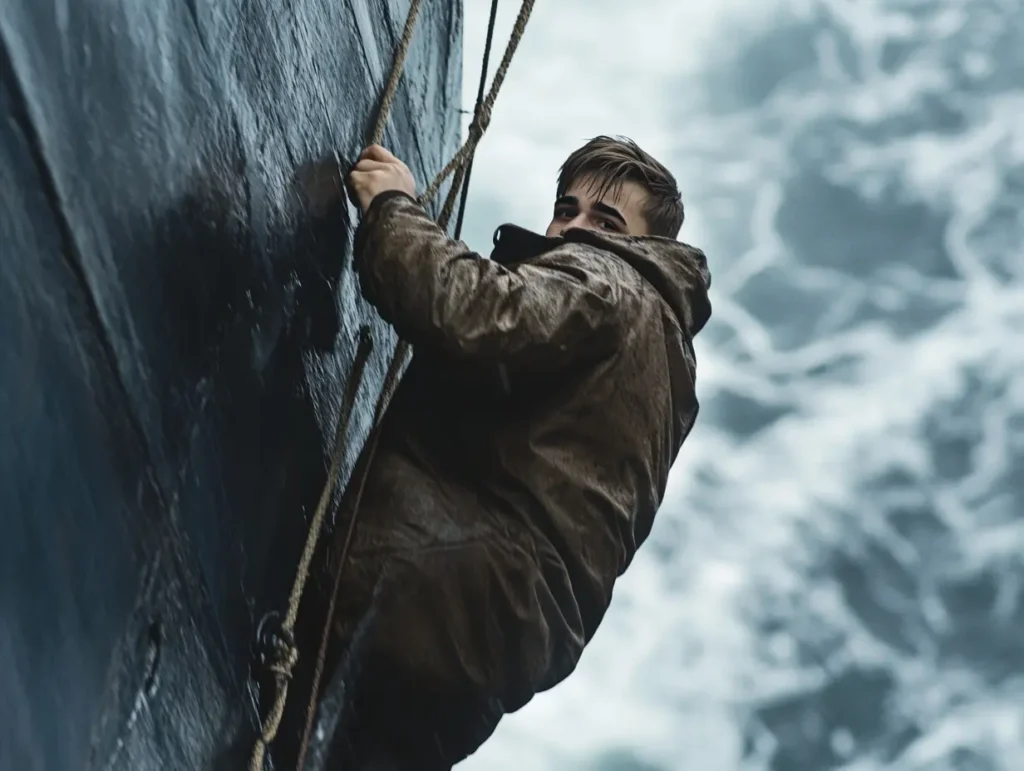
He tightened the rope, planted his boot against the slick metal, and began the climb. Each pull burned his muscles, the rain making every move a gamble. The rope strained, his hands ached, and water poured down his collar. Yet with each step upward, the sense of mystery pulled him harder than fear ever could.
Somewhere above, someone needed him, or something was waiting. The rope bit into Elias’s palms as he pulled himself higher. The freighter loomed above him like a wall, its rain-slick sides gleaming whenever lightning cracked across the sky. Each flash lit up the rust and broken metal in blinding white, then left him in suffocating darkness again.
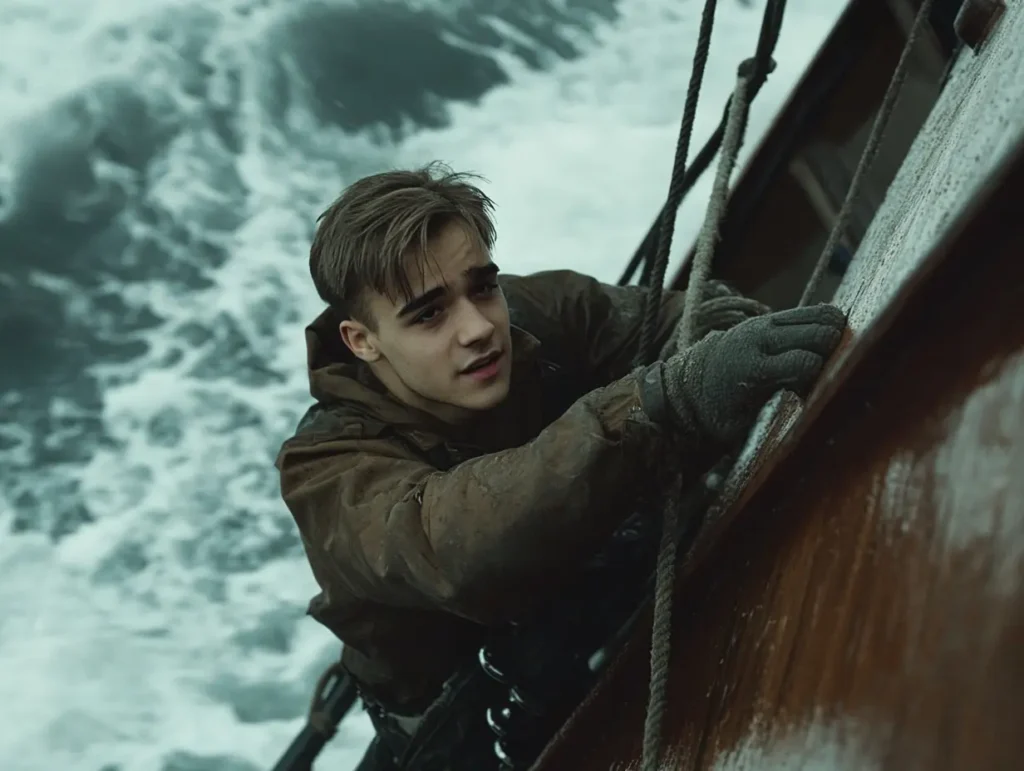
The ship groaned with the waves, tilting one way and then the other. The motion sent the rope swinging, jerking Elias hard against the hull. Pain shot through his shoulder as his arm slammed against the metal. He clung tighter, teeth clenched, boots scrabbling against the slippery surface. For a moment, he thought he would lose his grip entirely.
The rain was merciless, dripping down his collar, turning the steel under his boots into ice-slick treachery. His rope slid dangerously in his wet hands. He paused, gasping, forehead pressed against the hull. One wrong move and he’d fall into the churning black water below, his little skiff already looking like a toy rocking in the storm.
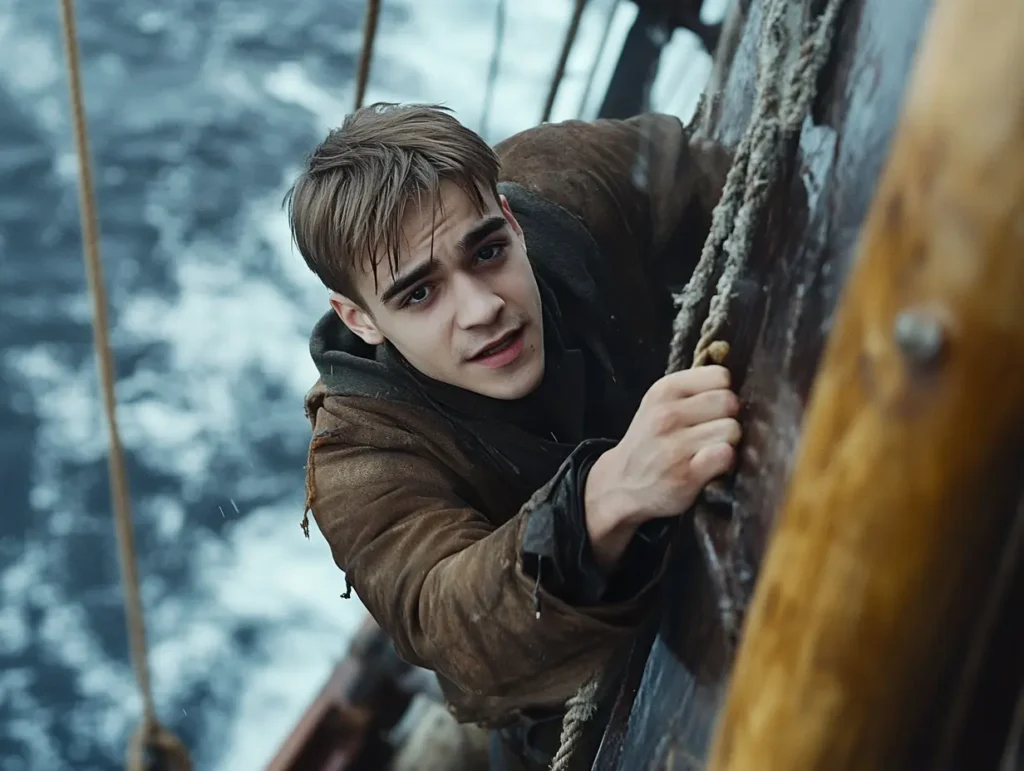
Above him, the sky cracked again with thunder. Lightning flashed close enough to make his hair prickle. The thought of being a dangling target on a wet rope sent a new surge of fear through him. He climbed faster, forcing his aching muscles onward. Every pull felt heavier than the last, but he refused to stop.
The ship shifted with another swell, leaning toward him, then away. Each tilt threatened to swing him wide into open air. His boots slipped once, the rope burning his hands as he slid a foot down before catching himself again. His heart hammered against his ribs. “Almost there,” he whispered to himself, though the storm swallowed his voice.
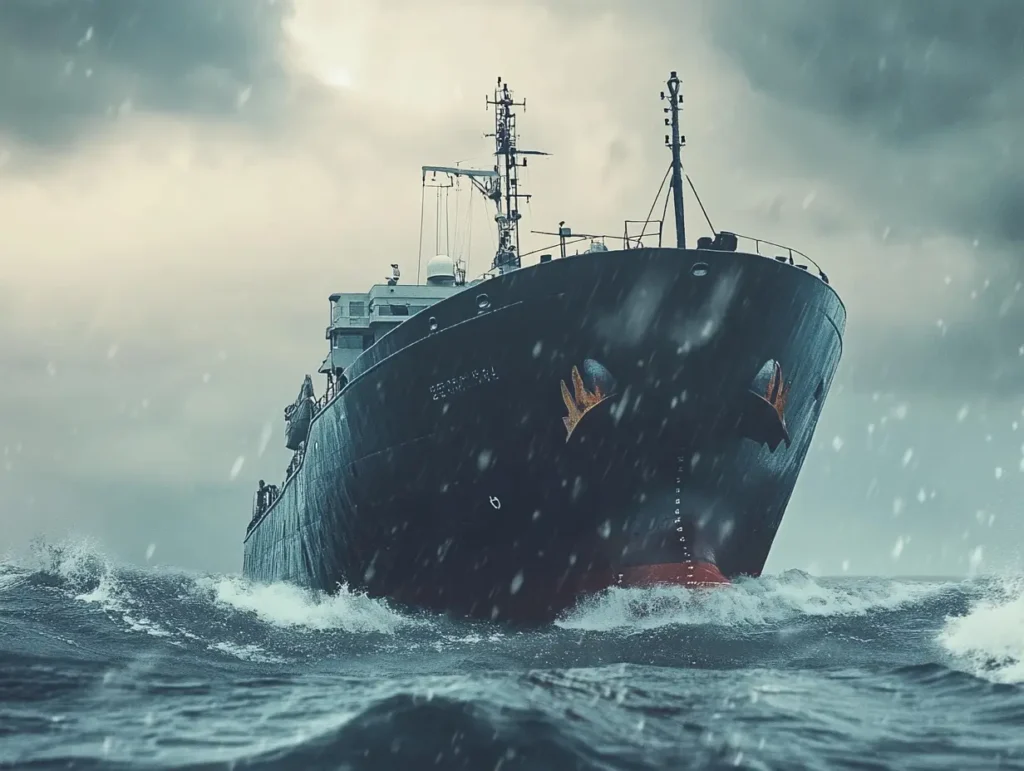
He focused on the rail above, just a few more pulls away. His arms trembled, the rope slick and biting into his palms, but he gritted his teeth and kept climbing. Finally, with one last surge of strength, Elias threw an arm over the railing. He hauled himself up, boots scraping, and tumbled onto the deck in a breathless heap. The storm raged on around him, but he had made it.
He was aboard. He lay there for a moment, chest heaving, rain slapping his face. The rope dangled behind him, swaying in rhythm with the freighter’s groans. He pushed himself upright, gripping the rusted rail for balance. The deck stretched out in both directions, littered with broken containers, twisted cables, and puddles that mirrored the flickering sky.
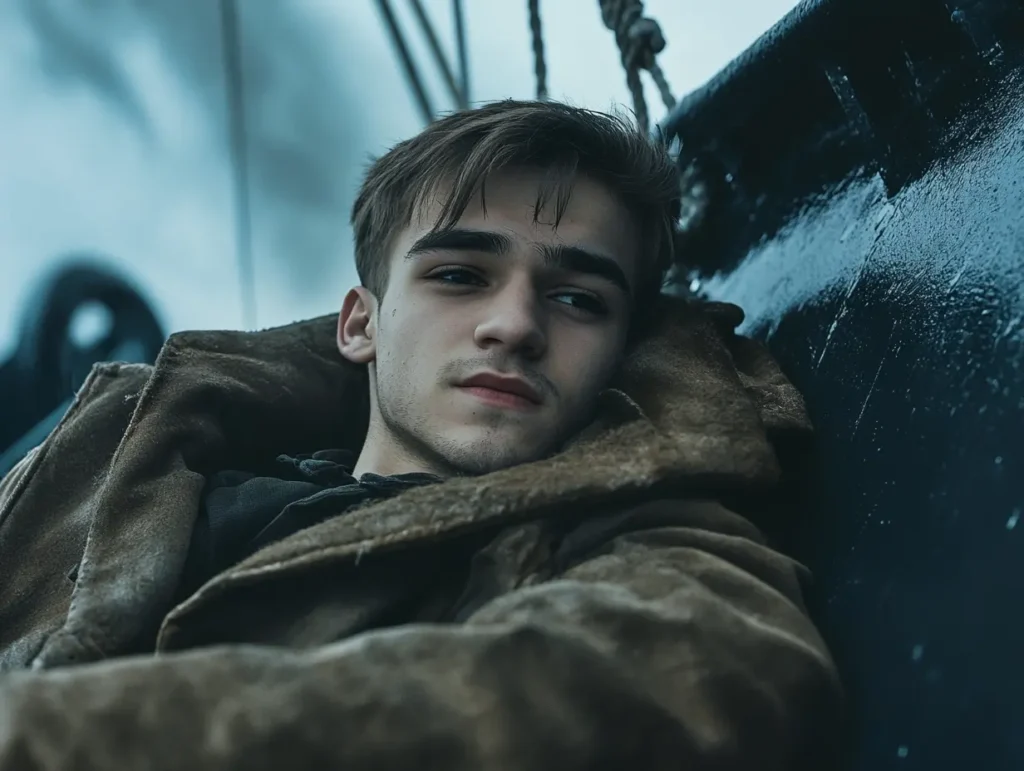
The ship shuddered beneath him, every sound amplified by emptiness. It felt less like a vessel and more like a carcass, hollow and rotting. Elias wiped rain from his eyes and scanned the space. No sign of movement. No waving figure.
Just shadows slipping between stacks whenever the clouds shifted. One of the container doors stood slightly ajar, swaying in the wind. Elias swallowed, edging closer. He pressed a hand against the cold metal and peered inside. Empty. Only coils of rope and a half-rotted tarp.
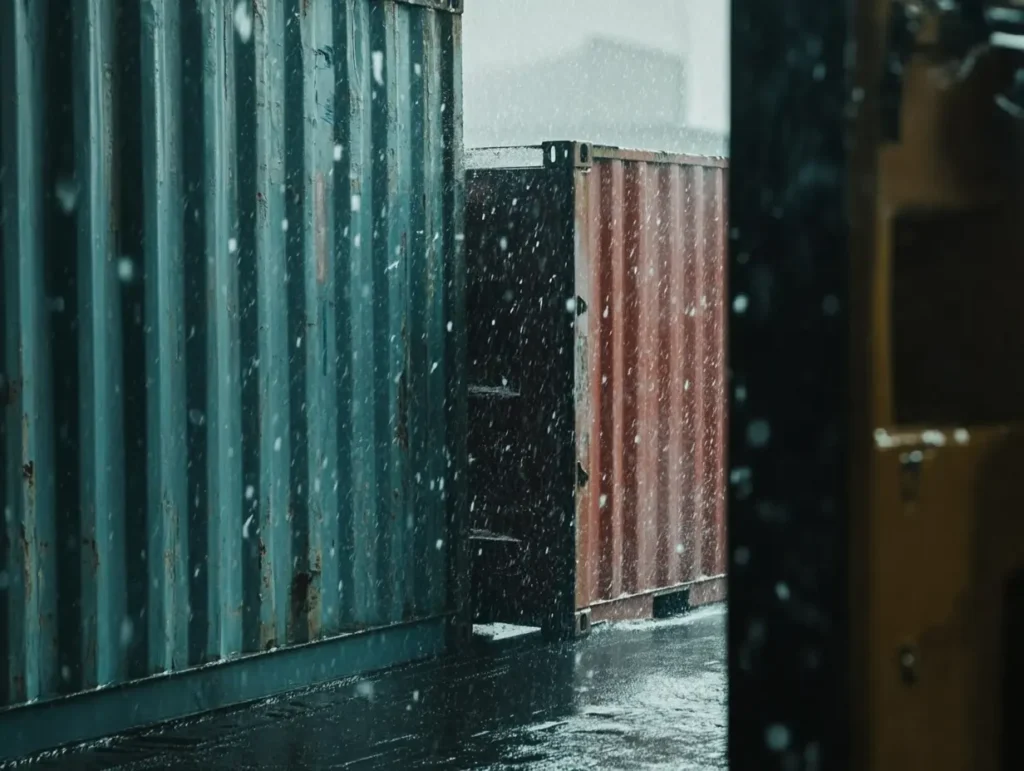
The smell of oil and salt hung heavy in the air. Elias pulled back, nerves buzzing. He reminded himself why he had come—the figure he had seen. Someone had waved at him. He was sure that he hadn’t imagined it. Further down the deck, a light flickered.
Elias blinked. In one of the windows of the bridge, a faint glow pulsed, like a lantern or a failing bulb. He raised his binoculars again, struggling to steady them with wet hands. The glass fogged, but when he cleared it with his sleeve, the glow was still there.
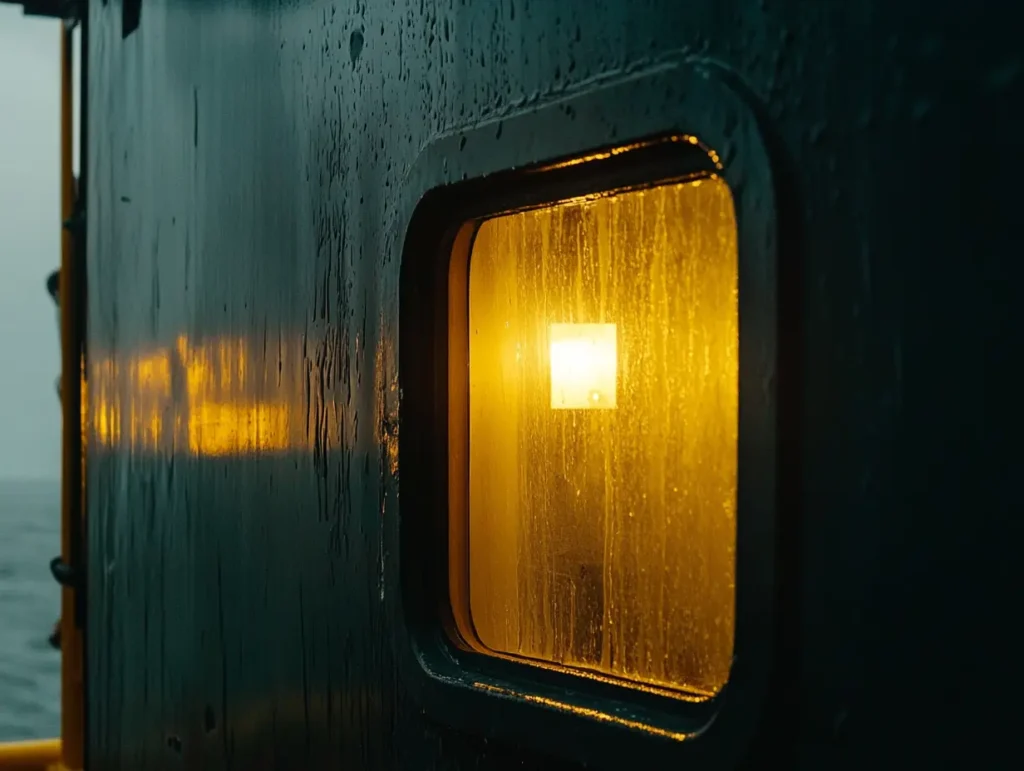
He thought he saw movement behind the window, the shadow of someone passing across it. “Hello?” he called, his voice cracking in the storm. It was a foolish thing to do—his shout barely carried over the rain, but the sound of his own voice steadied him. No answer came. Only the moan of wind through broken railings and the dull slap of waves against the hull.
Elias pressed on, each step heavy with both dread and determination. The freighter seemed endless, a maze of containers and cables. More than once he thought he heard footsteps behind him, quick and light, but when he spun around, there was only rain and steel. He reached the stairwell leading up toward the bridge.
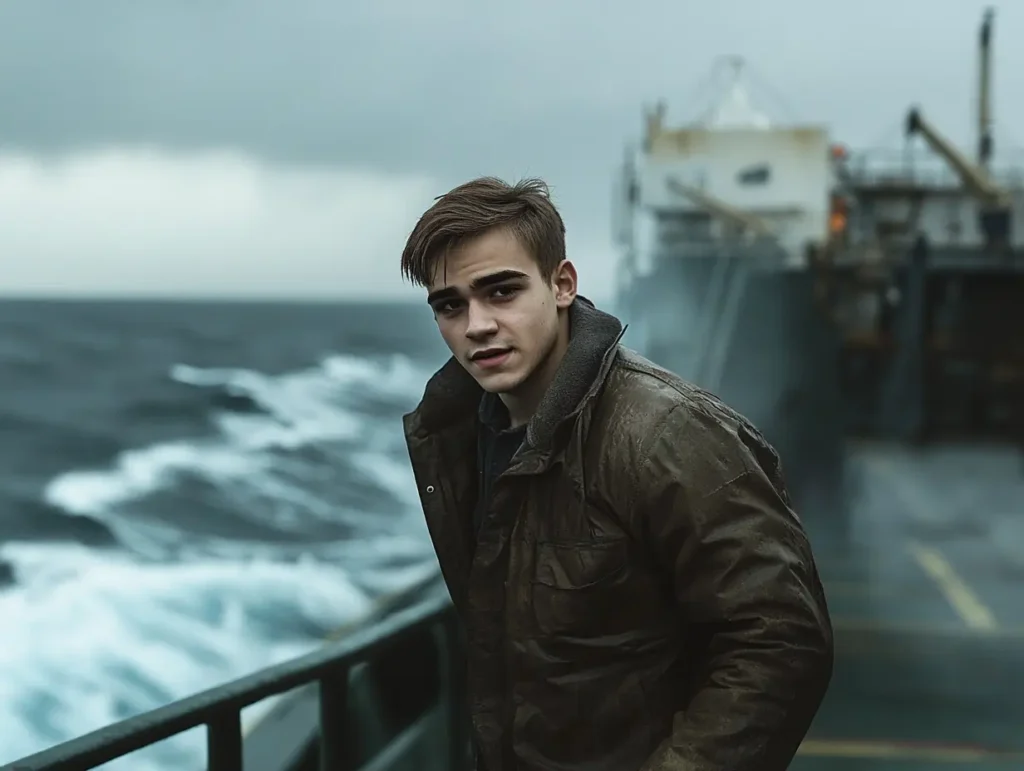
Rust flaked under his fingers as he gripped the railing. The faint glow from the window shone more clearly now, warm against the cold gray rain. His pulse raced as he began to climb. If someone was alive here, this was where he would find them. If not… he would find something else. Elias reached the top of the stairwell, boots slipping on the rusted steps.
The storm boomed outside, shaking the walls with each crash of thunder. He pressed against the bridge door and shoved hard. It gave way with a groan, swinging inward to reveal the dim, cluttered control room.
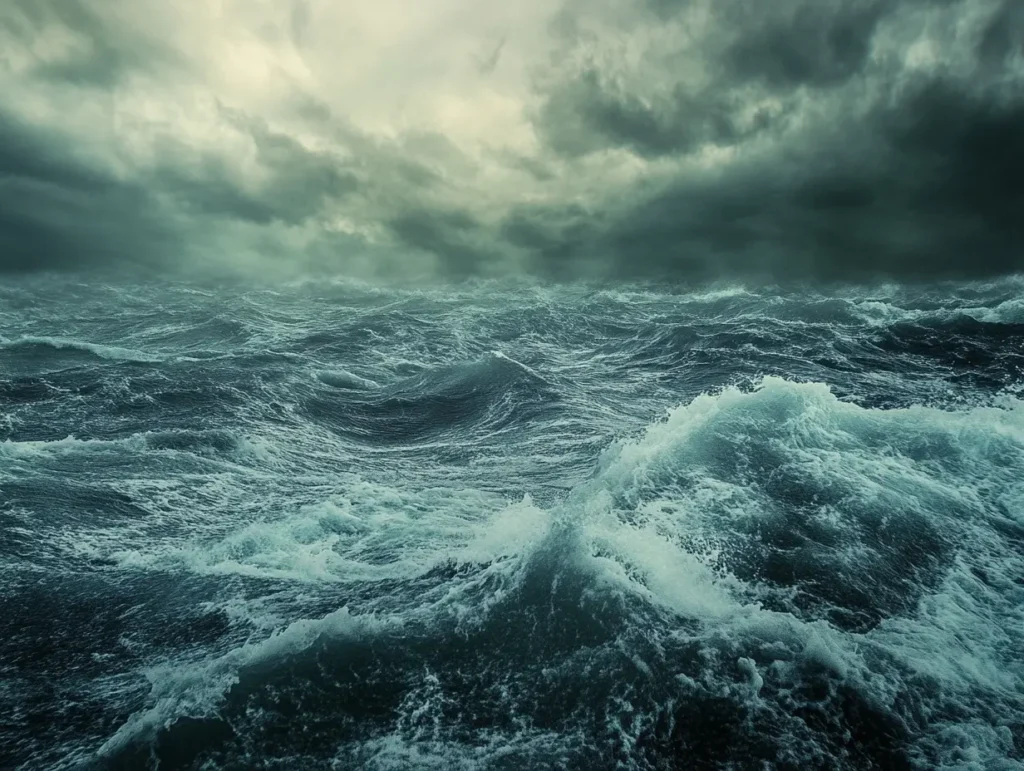
The smell hit him first, damp metal, oil, and something else, faint but unmistakable: the sharp tang of sweat. His eyes swept the room. Old charts lay scattered across the consoles. A chair was pushed back, still rocking slightly as if it had been moved a moment ago. And then he saw it. In the far corner, half in shadow, a figure stood.
Elias froze, breath locked in his chest. Rain drummed on the glass behind them, lightning flashing just enough to outline the shape of a man. He was thin, clothes ragged, hair plastered to his head. His hands were raised slightly, palms open, not in threat but in caution. “You… you’re real,” Elias whispered, more to himself than to the stranger.
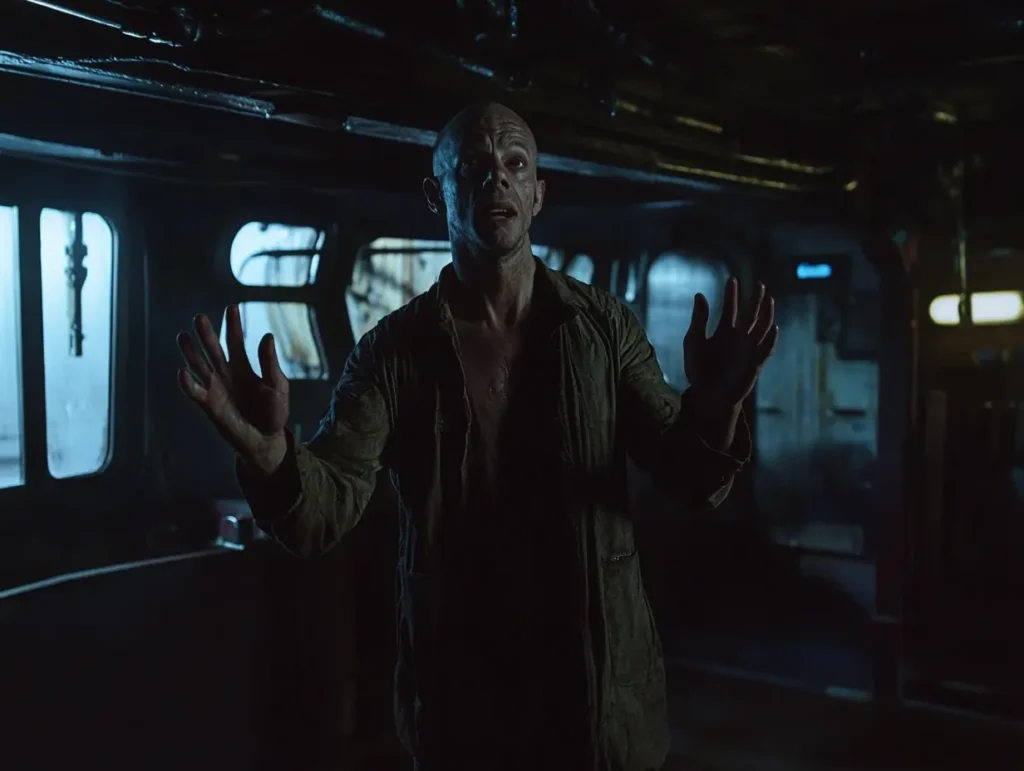
The man blinked, lips cracking as he spoke. His voice was hoarse, raw, as though unused for days. “Help me.” Elias’s heart hammered. All the fear and doubt that had built since he first spotted the wave on the deck poured into this single moment. He stepped forward, his boots echoing on the steel floor. “Who are you? What happened here?”
The man swayed, gripping the edge of the console for balance. Up close, Elias could see his face; sunken cheeks, eyes bloodshot, stubble grown wild. “I… I didn’t think anyone would come,” he rasped. “My name’s Callen… I wasn’t supposed to be here. I stowed away. I woke up one day to the ship being abandoned and left to drift.”
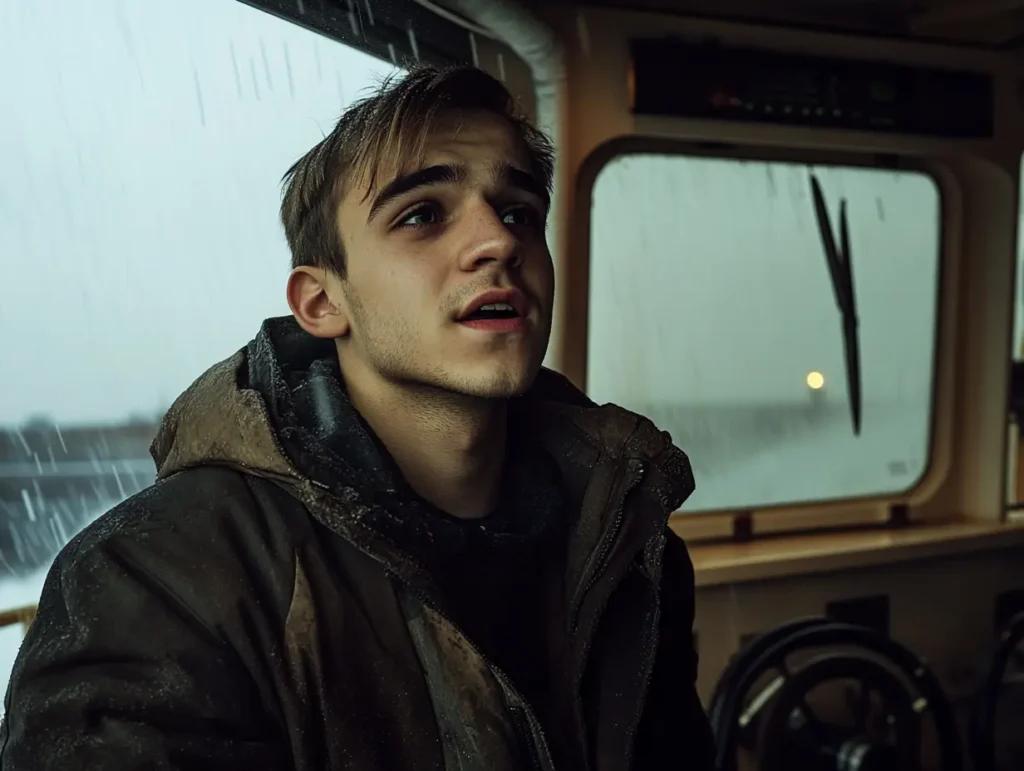
Lightning lit the room again, and Elias’s gaze flicked to the man’s arm. It was wrapped in a dirty bandage, stained dark. Elias’s mind raced. A whole crew, gone without a trace? Why would sailors desert a vessel this size? Pirates? Smugglers?
The thought chilled him, but the questions scattered when he looked back at Callen. The man was trembling, half-collapsed against the console, every breath ragged. Whatever mystery lingered in the ship’s empty halls could wait; Callen needed help now.
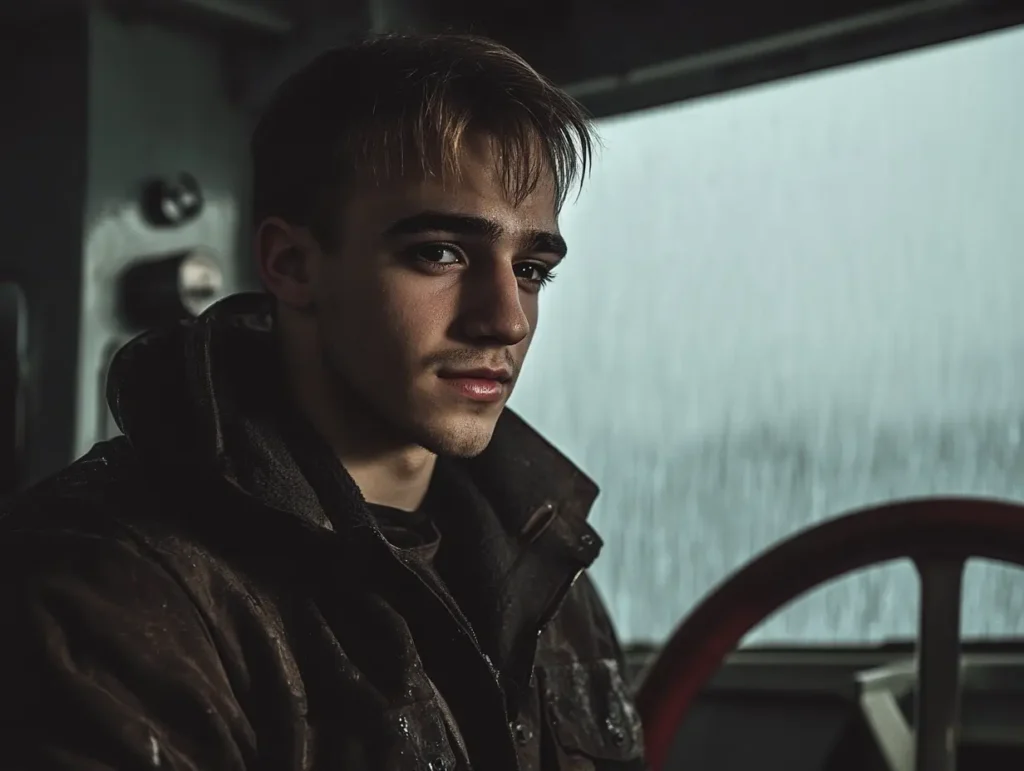
Elias took another cautious step closer. The storm outside howled against the glass, but in that moment, the world felt unnervingly still. Whoever this man was, he was no ghost. He was alive, desperate, and carrying a story buried within the rusting ship’s walls. Elias eased him into the captain’s chair, his body frail and trembling.
“Stay with me,” Elias urged, slipping a hand into his coat. His fingers found the handheld radio he always carried when out on the water. He thumbed it on, static crackling in his ear. “Coast guard, this is Portmere civilian vessel. Emergency! Abandoned freighter adrift near the village—repeat, emergency!” His voice cracked as he pressed the call button again.
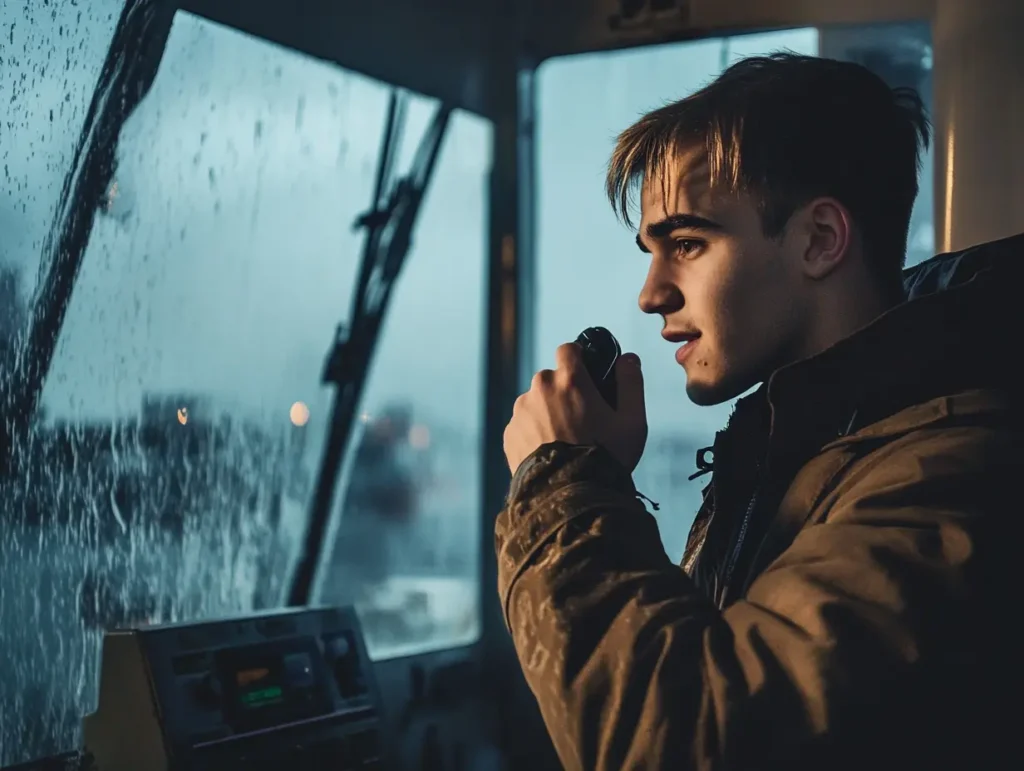
“We have a survivor on board. Request immediate rescue!” The radio buzzed, broken by faint words: “—copy… hold position—dispatch inbound.” Elias exhaled in shaky relief. At least someone had heard. Then the ship lurched. The sound came first; a deep, grinding roar that vibrated through the steel floor.
Elias stumbled, grabbing the railing as the freighter tilted violently. Outside, the view shifted, waves exploding against jagged black rocks that jutted from the surf. The ship had struck the shallows. Metal screamed as the hull scraped, tearing open somewhere below. The entire vessel shuddered with the impact, containers rattling like dice in a box.
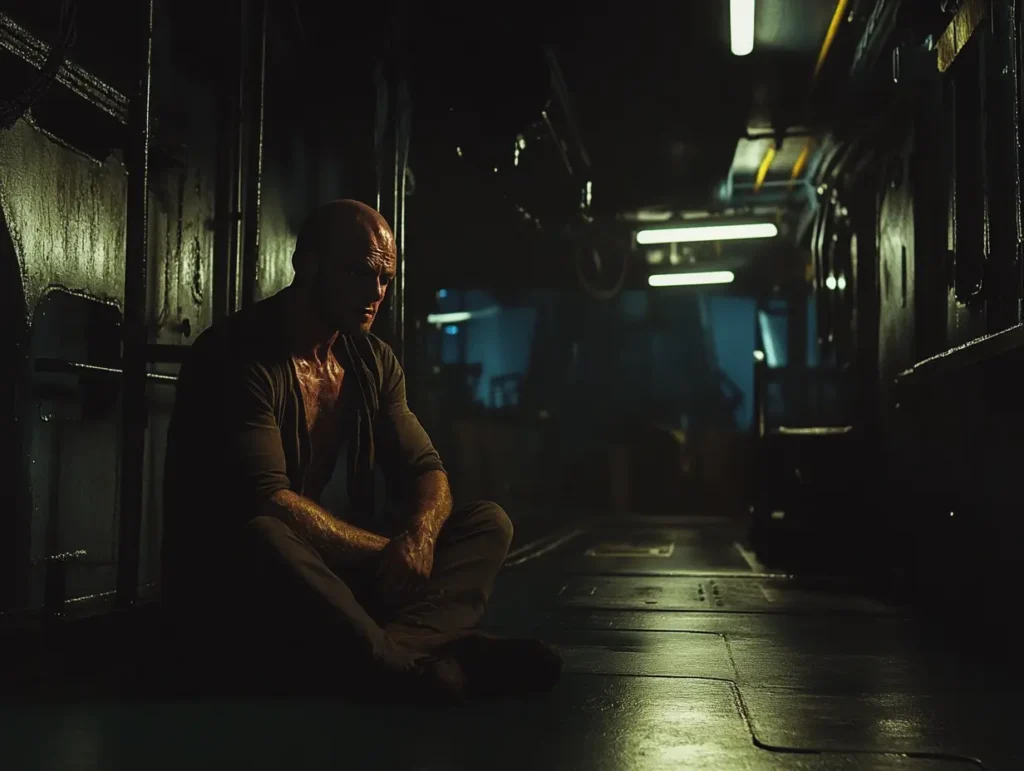
Elias’ stomach dropped. “No, no, no—this thing’s going to split!” Callen said while clutching the armrests with white knuckles. His eyes widened in panic. “It’s grounded—she’s tearing herself apart!” His voice was hoarse, but the terror in it was sharp enough to cut through the storm.
Elias snatched the radio again, holding it close to his mouth. “Coast guard! The ship’s hit rocks! We don’t have long!” “—ten minutes… hold tight…” the reply sputtered through the static. Ten minutes. The bridge groaned as though it were alive, protesting the punishment of the waves slamming the broken hull.
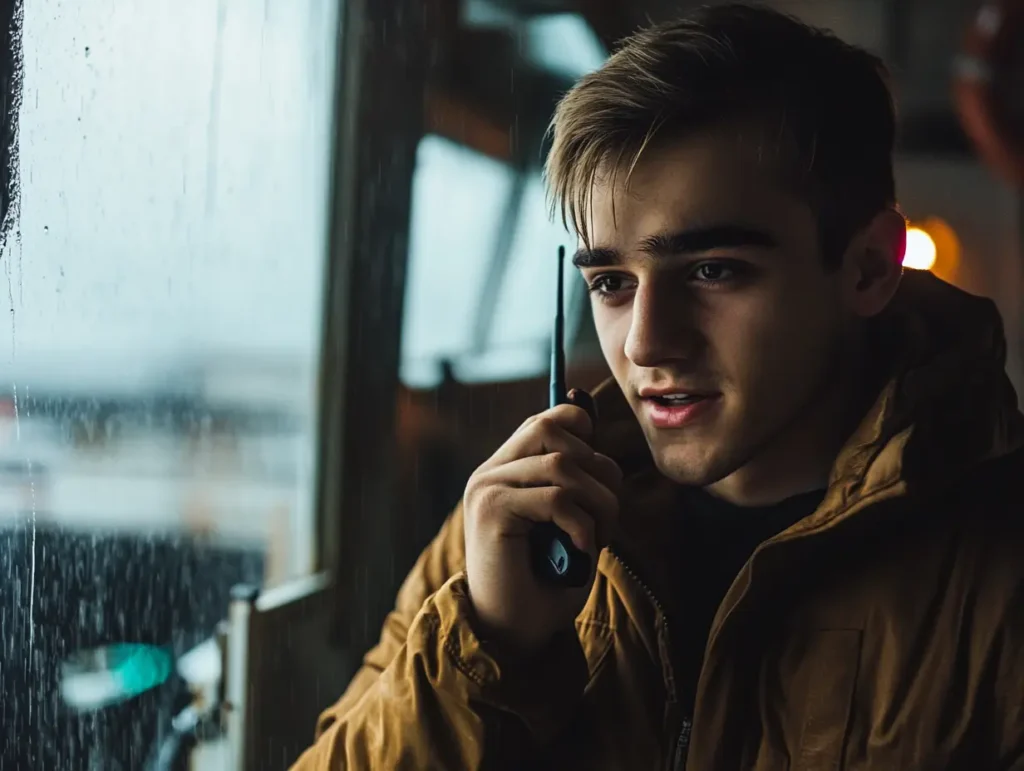
The rain lashed harder, lightning tearing across the sky. Elias turned back to Callen. “We can’t stay here—if the bridge goes under, we’re done.” Callen’s face was pale, lips trembling. “I… I can’t run.” He looked down at his injured arm, the bandage soaked dark. “You should go.” Elias shook his head fiercely. “Not a chance.”
Another shudder rolled through the ship, pitching the floor beneath them. A crack echoed from somewhere deep below, water forcing its way into the belly of the vessel. The air filled with the smell of oil and salt.
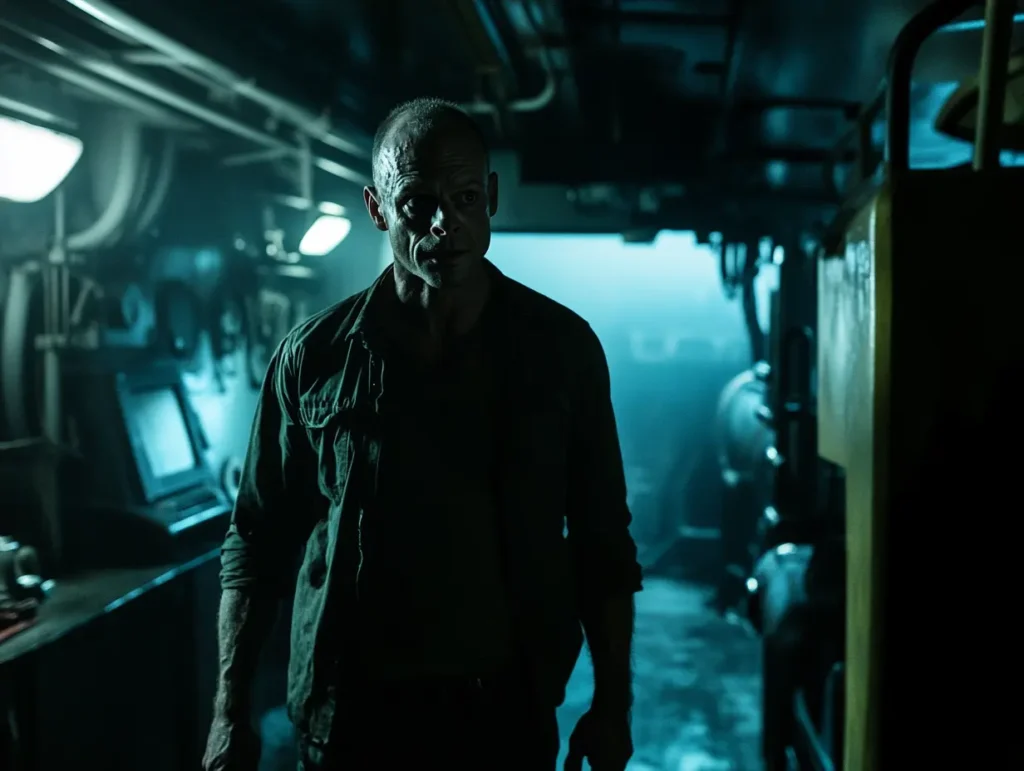
Elias crouched beside Callen, gripping his shoulder. “You’ve survived this long. You’re not dying here. We hold until they come.” Callen’s eyes welled with tears, but he nodded weakly. The freighter moaned and leaned further toward the rocks, as if surrendering to the sea.
Elias steadied himself against the console, heart racing, every creak of metal sounding like the last. Every second felt stolen now. The coast guard had minutes to arrive, or the ship would bury its secrets, and them, with it.
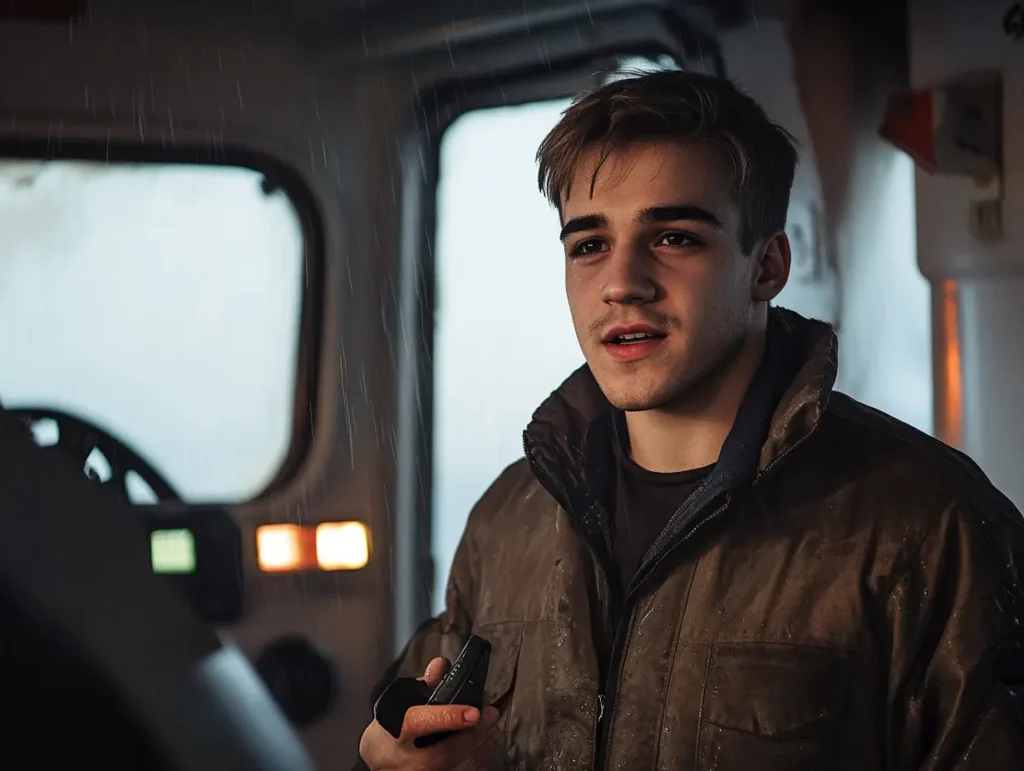
The grinding of steel against stone grew louder, shaking the bridge like an earthquake. Elias grabbed Callen under the arm. “We can’t stay here. Move!” Together they staggered out into the storm, rain lashing their faces, wind cutting like knives.
The deck tilted sharply, containers groaning against their chains. Every few seconds the ship jolted, sinking lower as the sea forced its way inside. Elias half-dragged, half-carried Callen toward the railing. His eyes darted to where he had tied his skiff. The small boat bobbed uselessly in the waves, but it was no longer within reach.
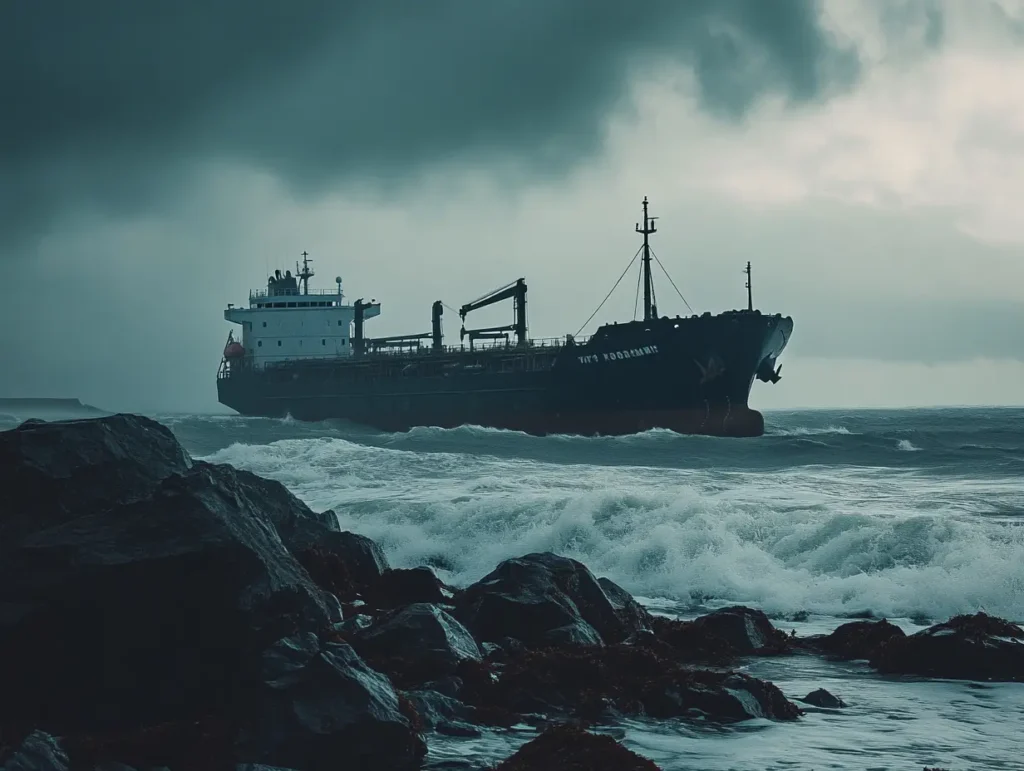
The freighter had drifted, pulling them yards away. The skiff was a speck in the storm, tossed too wildly to help them now. “Damn it,” Elias muttered. The deck beneath their boots pitched again, throwing them against the railing. Callen clutched Elias’s shoulder, his face pale. “It’s going down,” he gasped.
Elias scanned the black water below, foam churning where the freighter’s hull met the rocks. The thought made his stomach twist—jumping into that chaos with Callen injured could mean drowning before help ever came. But staying aboard meant certain death. The ship was collapsing beneath them.
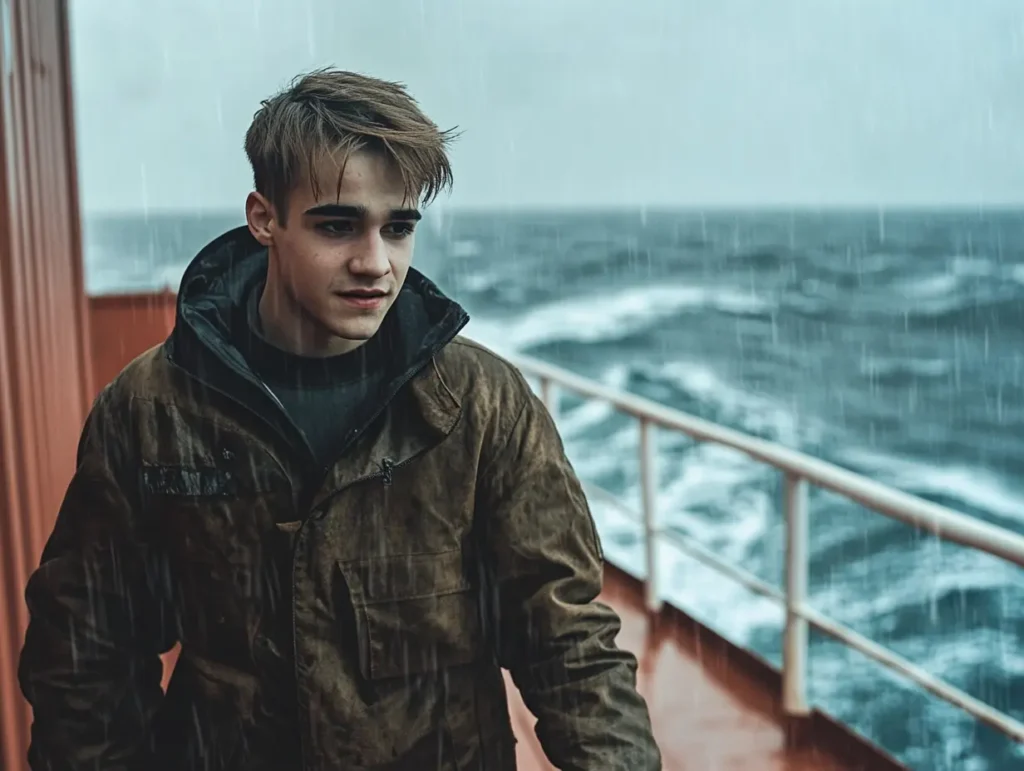
Lightning split the sky, illuminating the deck in stark white. Elias gripped Callen tighter. “We may have to jump,” he shouted over the storm. His voice cracked, the decision tearing at him. Could he keep them both afloat long enough in seas like this?
Callen’s eyes widened with fear, but he nodded faintly, trusting Elias even as terror seized him. They climbed onto the slick railing, both men shaking as the ship leaned harder toward its grave. Then, a sound broke through the storm—the deep thrum of rotor blades. Elias whipped his head up. A helicopter burst through the rain, its searchlight slicing the night wide open.
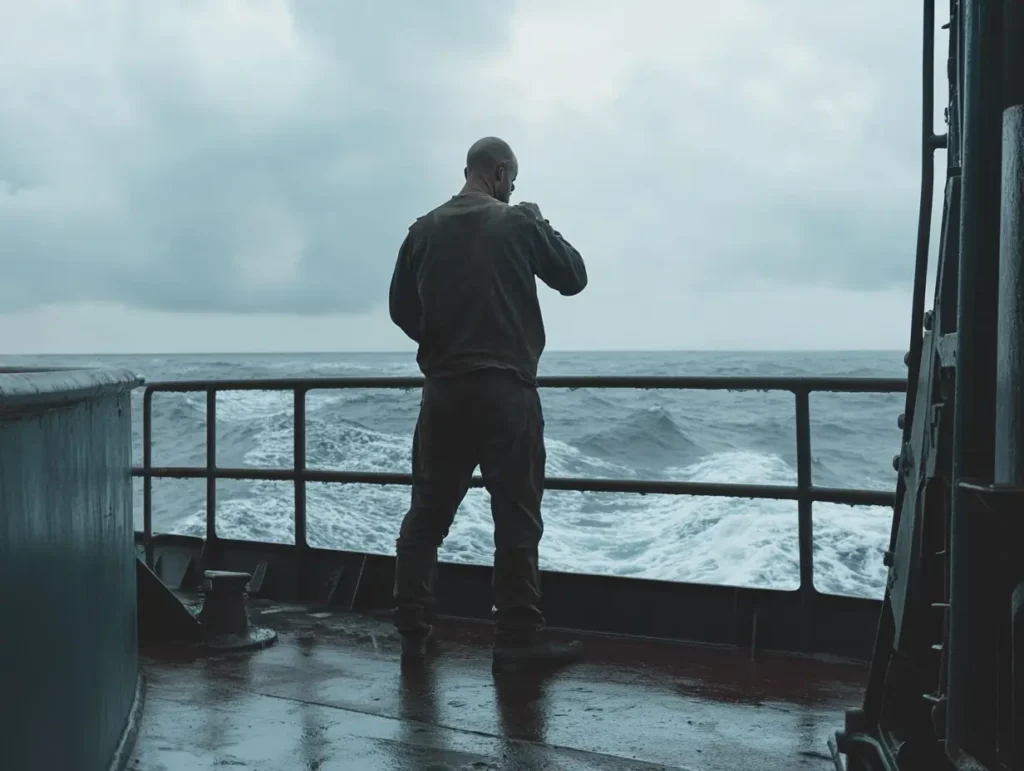
The beam locked onto them, a pillar of white that made Elias squint. Voices echoed faintly through a loudspeaker: “Stay where you are! We’ve got you!” The ship groaned louder, the deck beneath them beginning to split. Waves smashed higher, spraying salt into their faces.
The helicopter answered with a lowering winch line, a rescuer strapped to it, descending fast. “Hold on!” Elias shouted to Callen as the man in the harness landed on the tilting deck. In seconds, the rescuer clipped Callen in, hoisting him skyward as the ship wailed like a wounded animal.
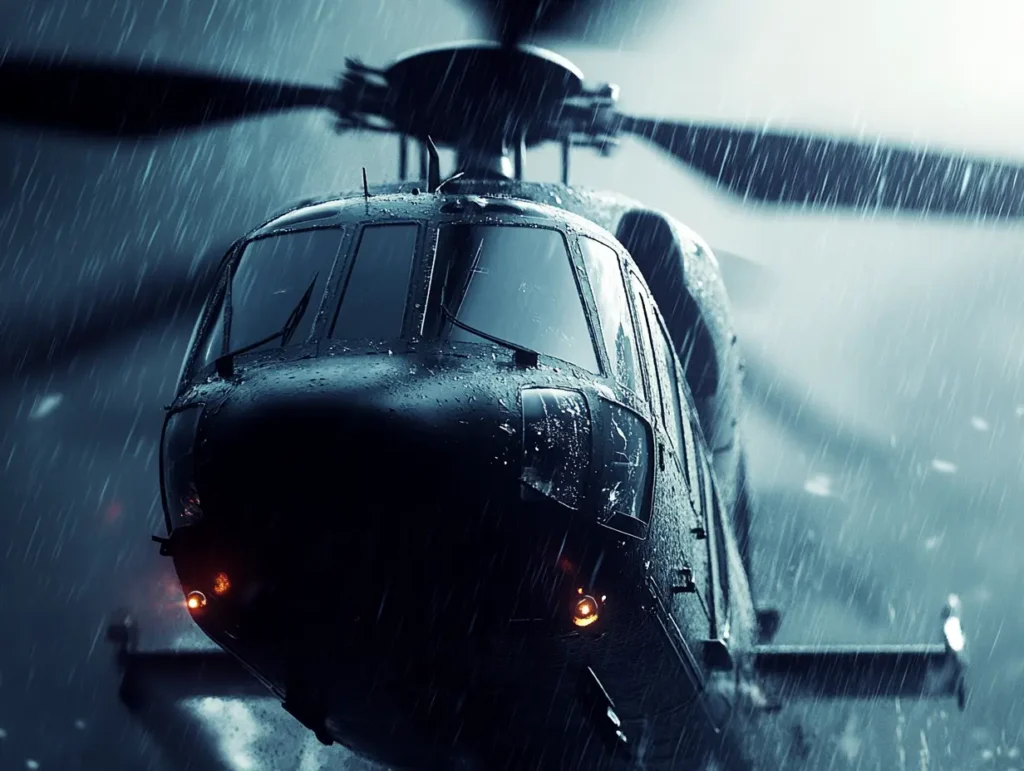
Elias clung to the railing, heart hammering as another wave rolled across the deck, nearly sweeping him overboard. The rescuer’s line swung back down, and Elias grabbed it with trembling hands. He was yanked skyward just as the freighter tilted further, steel shrieking, containers sliding into the sea with a thunderous crash.
Dangling in the storm, Elias looked down. The ship that had haunted Portmere for a day finally surrendered to the waves, vanishing into black water. He and Callen had escaped in the last possible moment. The helicopter lifted them higher, carrying them away from the wreck and back toward the safety of the village lights flickering faintly on the coast.
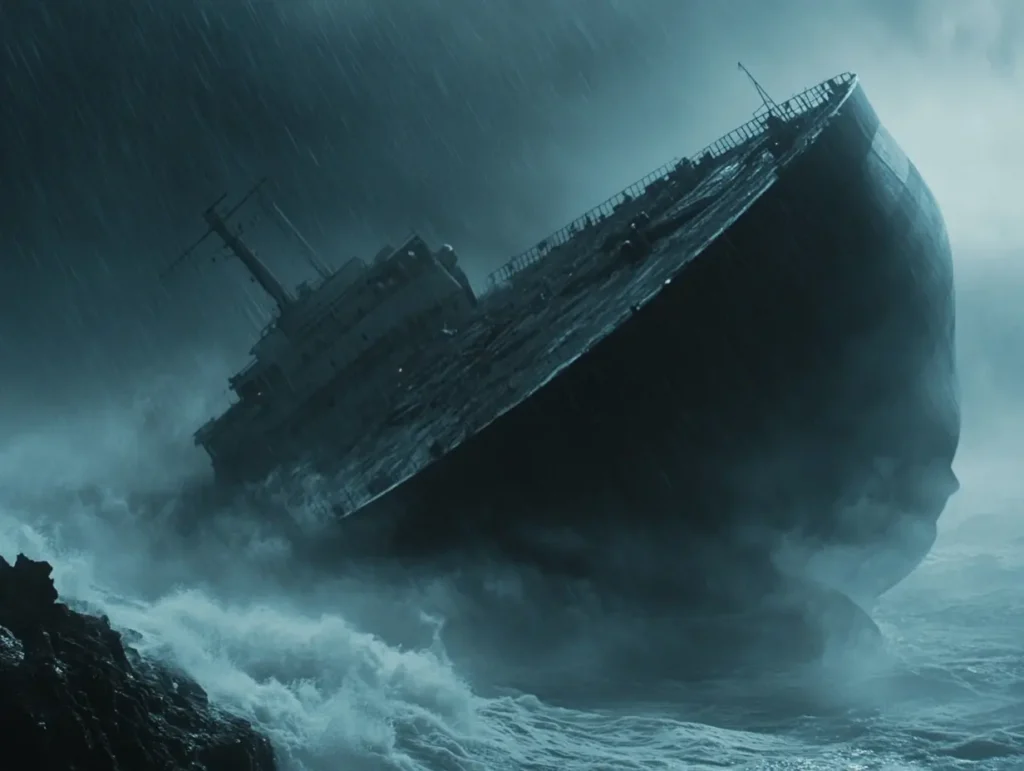
For the first time all day, Elias allowed himself to breathe. They had survived the ghost ship. By the time the helicopter touched down in Portmere, the storm had begun to loosen its grip. Rain still swept across the harbor, but the worst had passed, leaving the village huddled in flickering lamplight.
People had gathered despite the hour, drawn by the sound of the rescue craft circling overhead. When Elias stumbled onto the wet tarmac, Callen leaning weakly against him, the crowd erupted with gasps and whispers.
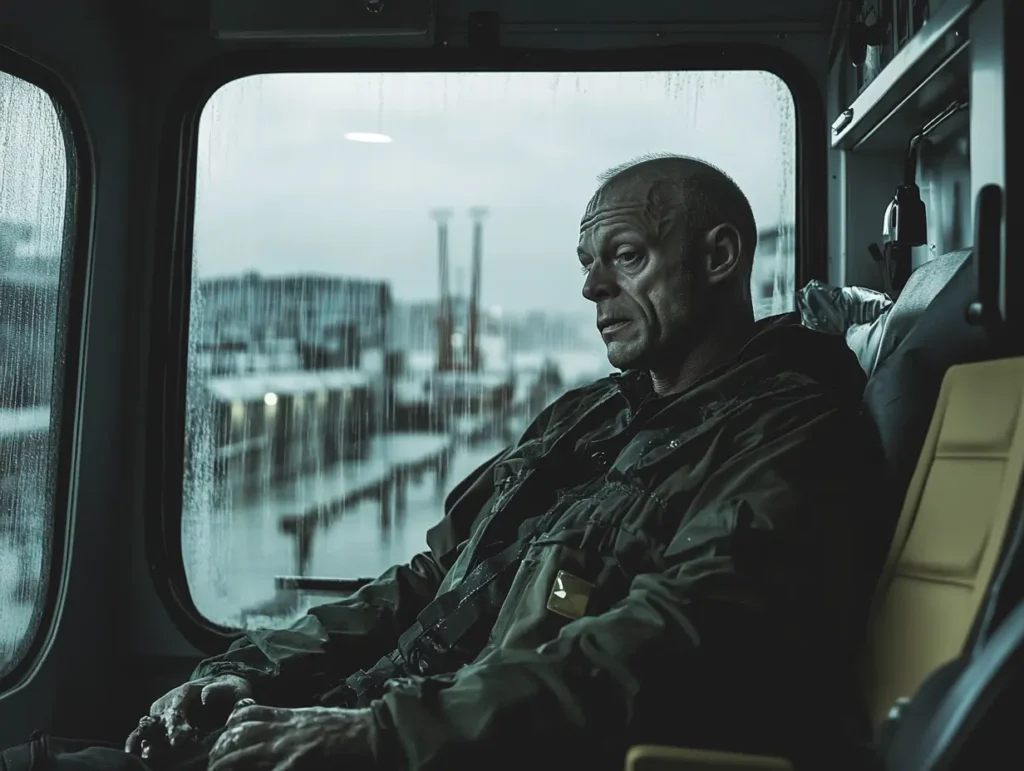
The police rushed forward, guiding Callen toward a waiting ambulance. His face was pale, his arm heavily bandaged, but he was alive. He turned his head, meeting Elias’s eyes one last time before the doors closed.
Gratitude glimmered in that look, but also a warning—as if some truths were better left unspoken. The harbor master gripped Elias’s shoulder firmly. “You’re lucky you came back,” he said gruffly. “That ship… it’s gone. Sank right where it struck. Took half the rocks with it.” His eyes narrowed. “What did you see out there?”
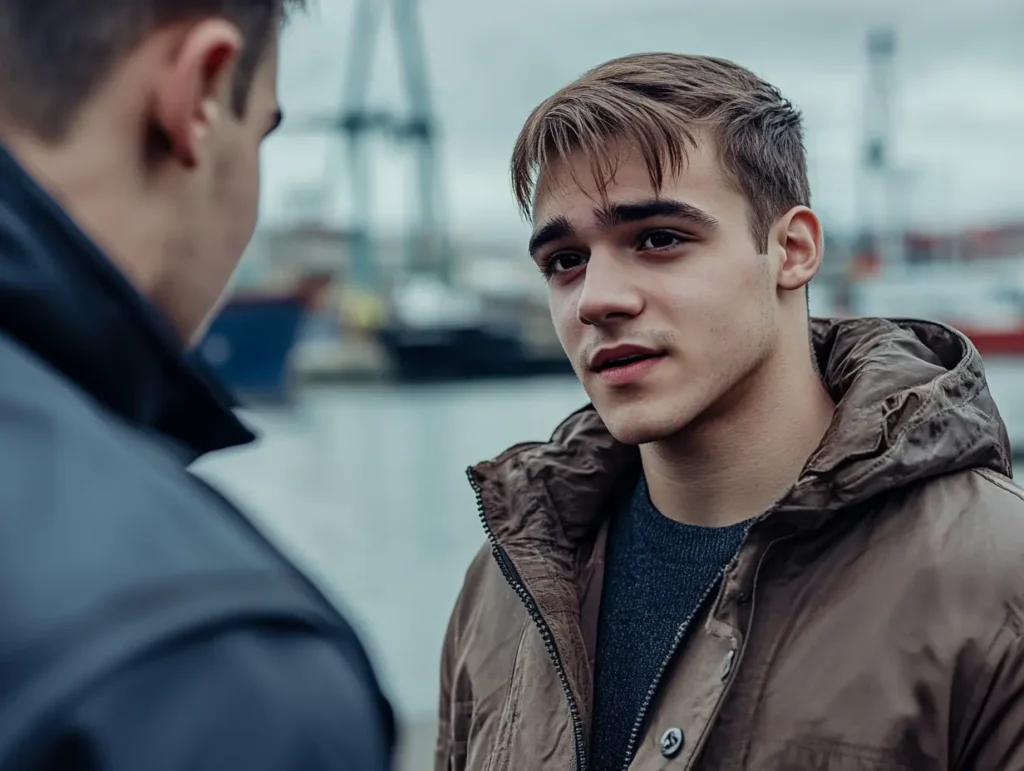
Elias opened his mouth, but the words faltered. He thought of Callen’s confession; that he was a stowaway, abandoned when the crew disappeared. If the wrong ears heard that, Callen might end up in more trouble than he’d already survived. Elias swallowed hard and forced a steady voice. “I saw a man who needed saving,” he said at last. It was the truth, though not all of it.
The harbor master studied him for a long moment before nodding. “Then that’s enough.” As the ambulance pulled away and the crowd began to disperse, Elias found himself staring out at the black horizon.
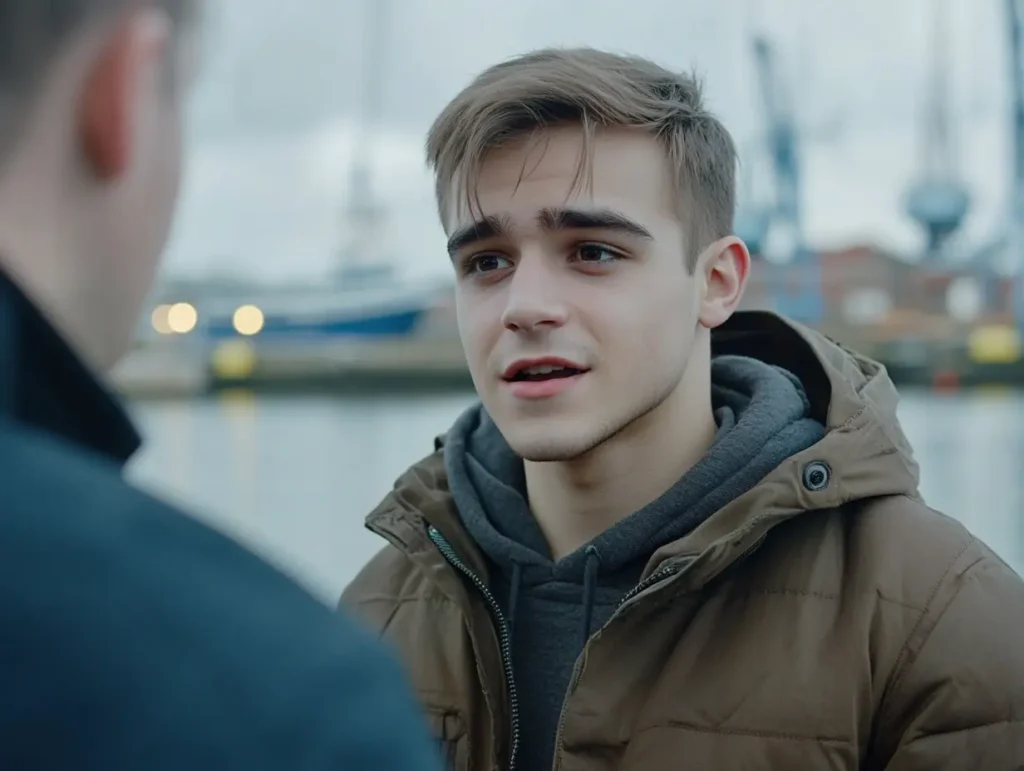
The waves rolled endlessly, erasing every trace of the giant that had haunted their waters. To the villagers, it would become a story told in pubs and around kitchen tables—how a ghost ship drifted into Portmere one stormy morning, only to sink before it could touch land. But Elias knew it wasn’t just a ghost story.
Someone had survived. Someone who wasn’t meant to be there, who had hidden in the shadows of that rusting hull until fate left him stranded. Callen’s secret wasn’t Elias’s to tell, and revealing it now would only bring the man more trouble than he deserved.
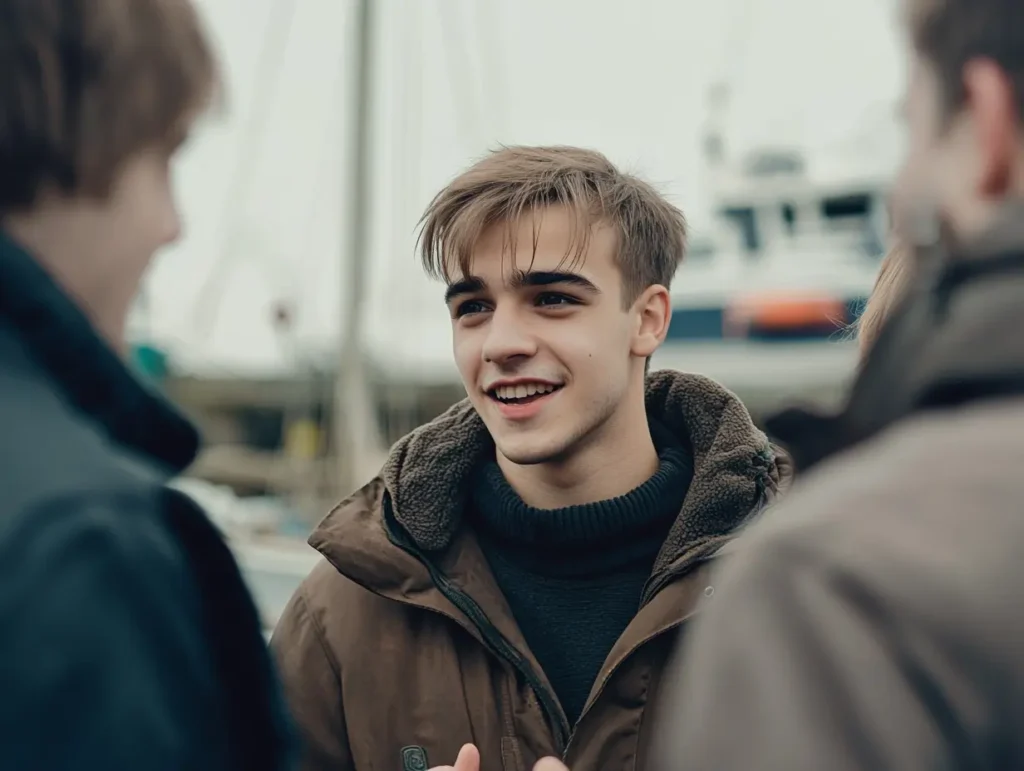
Back in his cottage, the storm still rattling faintly at the windows, Elias dried his clothes by the fire. His eyes wandered to the rope coiled in the corner, the same rope that had carried him aboard the freighter. It looked harmless now, yet it had tied him to something bigger than himself. He leaned back, staring into the flames.
He had wanted an adventure, and the sea had given him one. But as the fire popped and the night deepened, he couldn’t shake the sense that the real story had sunk with the ship, and that perhaps, for Callen’s sake was better.
